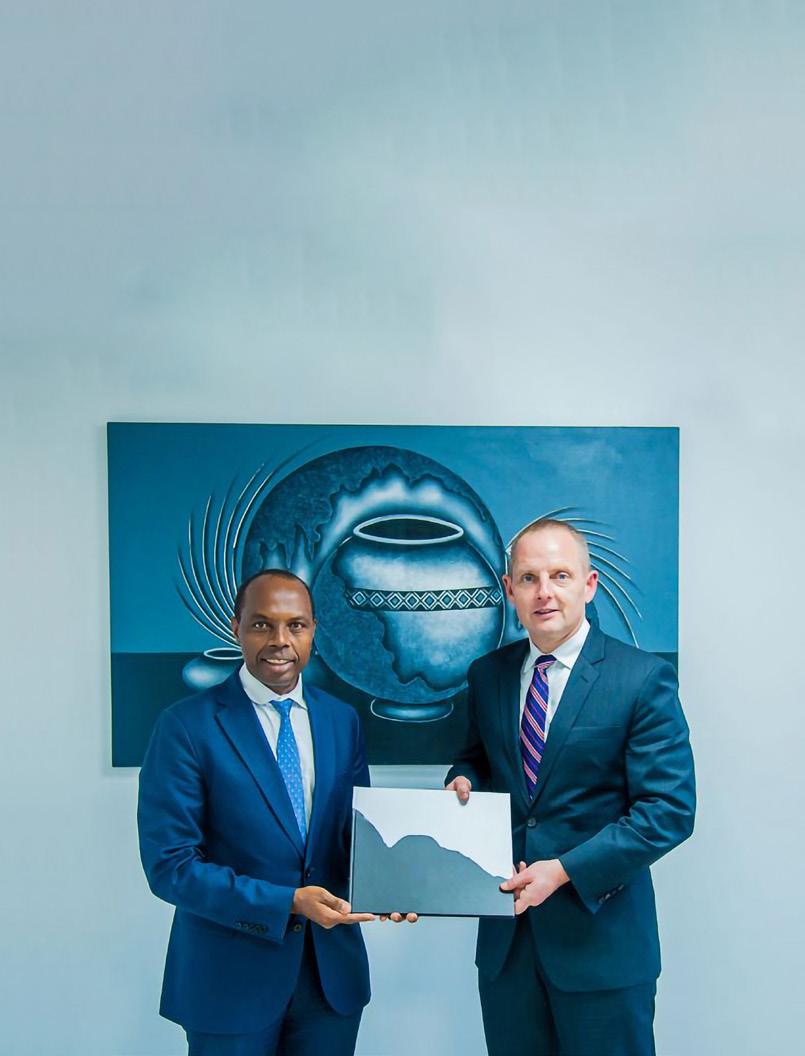

Advertise here
Creative Communications and Publishing Agency
PR/Branding/Marketing/Design Services
Custom Publishing- We offer tailored publishing solutions for both consumer and commercial sectors. Whether you need a glossy magazine, a professional annual report, or a captivating e-book, we've got you covered.

Emerge Edition
Premium advertising or sponsorship Magazine for Business Leaders and Entrepreneurs. Regions covered: Asia Pacific, Australia, Africa, EMEA, and US

Emerging Brand Africa (Advertising)
Business News Media for Emerging Markets
Events and Media partnership

The Trade Envoy - Emerging Markets: Insights & Diplomacy
The Trade Envoy is a comprehensive review magazine dedicated to the in-depth exploration of emerging markets, facilitating trade relations through incisive reporting across industries, and providing a platform for engaging discussions with key global trade diplomats and stakeholders.

Editor’s Foreword
Dear Readers,
Welcome to this special edition of Trade Envoy, where we look into the transformative sectors driving Africa’s growth. Over the last year, our team has had enriching experiences of participating in pivotal industry events and engaging in insightful discussions with trailblazers in international trade. These interactions have significantly influenced the themes we explore in this edition. We explore Africa’s unwavering pursuit of economic resilience, showcasing how these twin pillars are driving the continent’s growth engines, and in country-specific contexts.
Our narrative this year is woven around these high-growth sectors that epitomize Africa’s transformative journey. From global supply chains to the digital revolution that’s redefining agriculture and health.
We spotlight Africa’s mining sector, where sustainability and ingenuity intersect, reflecting the continent’s dedication to environmental stewardship. We also look at the Australian mining industry as a global leader. How can Africa leverage Australia’s expertise to harness its vast reserves of critical minerals essential for the future of technology and energy?
Singapore is recognized as a global financial capital. What lessons can Africa’s financial sector learn from it to reimagine finance for a resilient economy? We examine how fintech innovations are fostering economic growth and stable frameworks.
The edition pays homage to the power of cultural diplomacy and trade, reflecting on a year filled with momentous events including Africa joining G20 as a permanent member. Negotiation on the renewal of AGOA as equal trade partners, among others. Through these narratives, we underscore the continent’s growing influence and its intricate tapestry of global trade dynamics and diplomacy.
At TradeEnvoy, we remain committed to highlighting the complex interplay of these factors, offering our readers a rich, multi-dimensional perspective on Africa’s place in the global economic ecosystem. Each article, and each interview, is carefully curated to bring you insightful analyses and diverse viewpoints from key figures shaping the future of these emerging economies.
We hope that these narratives will keep you informed about an Africa that is growing, evolving, and resilient, steering towards sustainable and robust economic stability. As always, we are keen to hear your thoughts and perspectives on various growth industries.
Catherine Jonathan, Managing Editor The TradeEnvoy | Emerging Brand AfricaRwanda’s Economic Transformation
A Land of Opportunity and Robust Investment Environment

Rwanda, renowned as one of Africa’s fastest-growing economies, presents a landscape ripe with investment opportunities and a supportive regulatory environment. The Rwanda Development Board (RDB) has been instrumental in showcasing the nation as an ideal destination for foreign investment, highlighting its strong economic growth, low-risk profile, and conducive business climate.
Growth and Stability: Key Economic Indicators
Rwanda has seen remarkable economic growth, averaging 17.58% per annum since 2007, making it one of the fastestgrowing economies in Africa. Notably, it’s the 6th safest country globally for solo travelers and ranks 2nd in Africa for ease of doing business. The country boasts a young and growing population, with over 70% under the age of 30, ensuring a vibrant and dynamic workforce.
Investment-Friendly Policies and Incentives
Rwanda’s investment environment is characterized by multiple incentives for exporters and priority sectors, such as:
• Corporate income tax holidays for significant investments. Zero tax for regional headquarters based in Rwanda.
• Accelerated depreciation rates and exemptions on capital gains.
• Duty-free imports of machinery and inputs within the East African Community (EAC).
• A highly digitalized administration, enabling efficient business registration and operations.
• Strategic Positioning as a Regional Hub
Strategic Positioning as a Regional Hub
Rwanda’s strategic location makes it a regional hub, particularly for
trade and logistics under the African Continental Free Trade Area (AfCFTA). It’s part of several robust trade agreements, both regional and intercontinental, offering access to significant markets in Africa and beyond. The country’s capital, Kigali, is increasingly being recognized as a gateway to neighboring markets and the African continent.
Infrastructure and Technological Advancements
Rwanda is investing heavily in infrastructure and technology, with initiatives like Kigali Innovation City and Kigali International Financial Centre. The country is also home to various sector projects in glass manufacturing, electric mobility, and packaging materials, offering diverse investment opportunities. These initiatives underscore the nation’s ambition to be at the forefront of the digital revolution and industrialization in Africa.

Agriculture and Agribusiness Opportunities
The agriculture sector in Rwanda presents numerous investment opportunities, from avocado farming to integrated meat farms. The Gabiro Agribusiness Hub, for example, aims to develop 10,000 hectares of irrigated land, significantly enhancing food security and job creation.
Kigali Innovation City: A Knowledge Economy Hub
Kigali Innovation City (KIC) epitomizes Rwanda’s aspiration to become a knowledge economy hub. This 61-hectare mixed-use development integrates university campuses, research facilities, residential areas, and retail spaces, offering numerous investment opportunities in education, technology, and real estate.
Building the Future: Education and Human Capital Development
Investing in human capital is a priority for Rwanda. Educational initiatives and partnerships with global institutions are aimed at nurturing a skilled and competent workforce, ensuring sustainable growth and innovation in various industries. The health sector in Rwanda is another area ripe for investment, encompassing both services and

manufacturing. Notably, the sector is progressing towards establishing the first vaccine manufacturing plant in Africa, in partnership with biotech firms. This initiative highlights Rwanda’s commitment to healthcare innovation and development.

A Pioneering Project in Renewable Energy
The Gasmeth project, focusing on the Lake Kivu gas project, exemplifies Rwanda’s commitment to clean energy. With an investment requirement of USD 130 million, this project aims to replace traditional fuels with Compressed Natural Gas (CNG), contributing significantly to Rwanda’s energy sector.
Special Economic Zones: A Catalyst for Growth
Rwanda’s Special Economic Zones provide an attractive platform for investors, offering benefits like duty exemptions and operational incentives. These zones are designed to support various sectors, including manufacturing and construction, enhancing the ease of doing business in Rwanda.
In conclusion, Rwanda stands out as an exemplary destination for investment in Africa. Its combination of rapid economic growth, stable governance, strategic positioning, and progressive investment policies makes it an attractive and promising landscape for global investors and a key player in Africa’s economic future.
Jean Claude NIYOMUGABO Co Founder, Speke FarmsMining Indaba’s 30th Anniversary Celebrating Progress and Vision for A Bold New Future
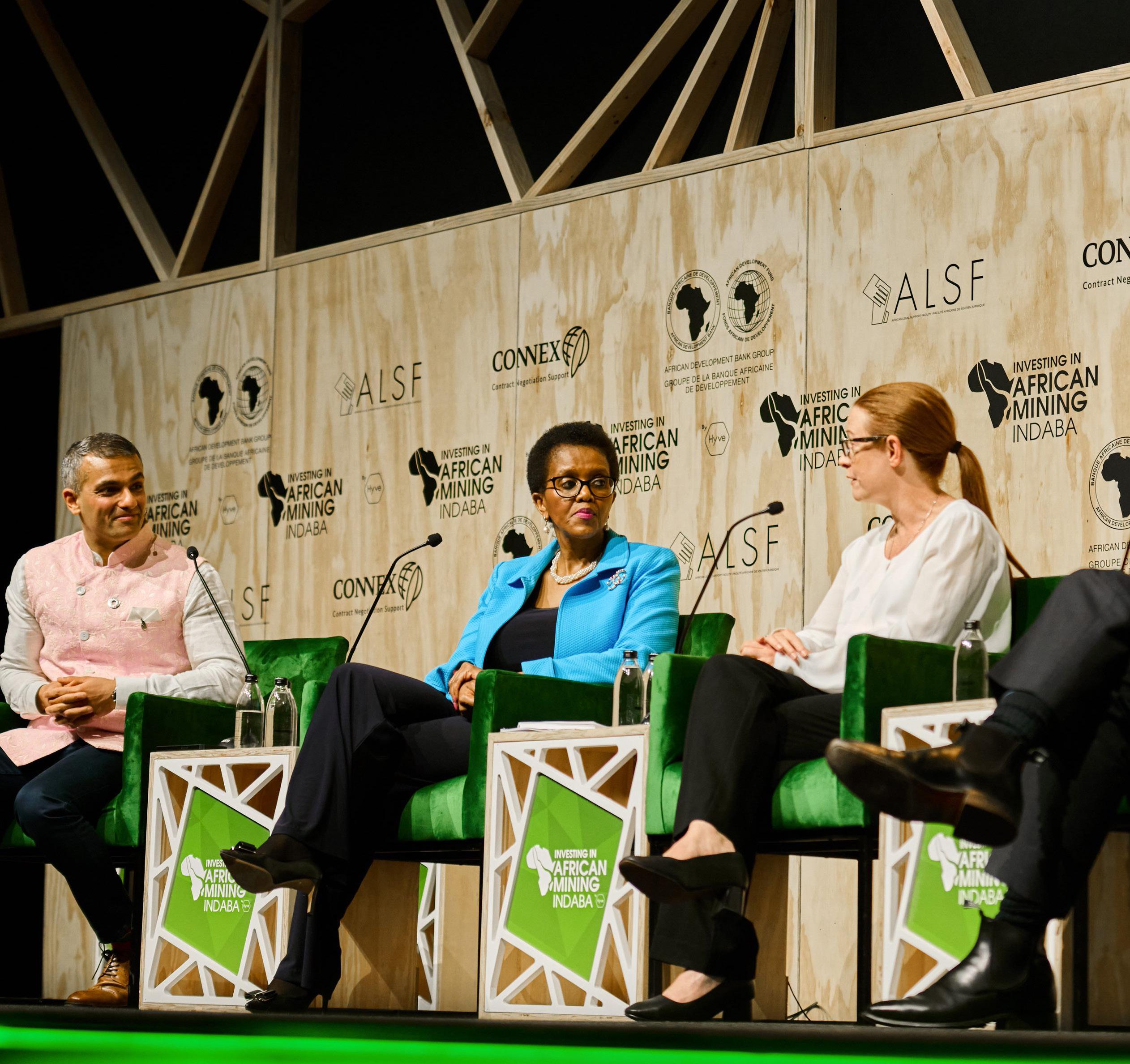
Mining Indaba, since its inception in 1994, has significantly influenced the African mining sector. This premier event, dedicated to fostering the growth of mining interests in Africa, has become a key platform for connecting mining companies with investors and initiating crucial industry dialogues.
The core mission of Mining Indaba is to drive sustainable investments in African mining. It highlights the importance of local mineral supply chains for economic growth, self-
sufficiency, and job creation in African communities. These supply chains also play a critical role in the global demand for critical minerals, essential for advanced technologies and environmental solutions.
Economically, Mining Indaba has had a substantial impact on South Africa’s GDP, indicating its importance to the regional economy. In addition to its economic contributions, Mining Indaba also focuses on community development and support. Emphasizing local
sourcing and partnerships with local suppliers, the event promotes local entrepreneurship and boosts local economies. Moreover, it has been involved in charitable initiatives, including supporting early childhood development and constructing educational facilities.
The 30th anniversary of Mining Indaba in 2024 represents a significant milestone, celebrating the progress in the African mining sector and looking towards a future of continued growth and innovation.

This event is not only a retrospective celebration but also a forwardlooking vision for the sustainable and innovative development of Africa’s mining industry
Reflections on Mining in Africa, and its Bold New Future
Theme of the Investing in African Mining Indaba 2024 – Embracing the power of positive disruption: A bold new future for African mining. ‘Disruption’ has come to describe a raft of rapid technological and

other advancements that have significantly changed the way we do business today. “Perhaps not many mining commentators would suggest that the traditional mining sector would embrace disruption, but there have indeed been various forms of disruption in the industry – several of them positive,” said Andrew van Zyl, Managing Director, SRK Consulting (South Africa).
Van Zyl points out that while disruption is often associated with risk, it brings a wave of positive change, especially in traditional sectors like mining. The rapid technological advancements and environmental considerations are redefining mining practices, aligning them with Africa’s growth narrative.
Responsible Sourcing and Ethical Supply Chains: The conference will address the increasing emphasis on responsible mining within Africa’s rich natural and social landscapes. This focus is crucial as the continent’s mining sector adapts to global environmental challenges and societal expectations, reinforcing Africa’s position as a growth engine in sustainable mining practices.
The Promise of Africa’s Rich Mineral Resources: Africa’s potential in battery minerals, crucial for the global energy transition, positions the continent as a key player in the future of mining. SRK Consulting’s reflections on their 50-year journey in the mining sector highlight the continent’s evolving role in meeting the global demand for responsibly sourced minerals.
Challenges and Opportunities: The session will also discuss the balance between managing current economic challenges in the mining sector and seizing opportunities presented by innovative and sustainable practices. This approach is vital for ensuring that the benefits of mining contribute to the growth and development of host countries and communities within Africa.
SRK Consulting’s Pioneering Role: SRK’s adaptation to the changing landscape of mining, with a focus on environmental, social, and governance (ESG) practices, mirrors the evolution of the industry. Their experience and foresight in addressing these aspects are indicative of Africa’s growing significance as a powerhouse in responsible and sustainable mining. Looking Ahead: Van Zyl emphasizes the mining sector’s role as a catalyst for economic growth in Africa. The future trajectory of mining must balance the management of present risks with the embrace of positive disruption, aiming for sustainable responses to societal demands and obligations.
Managing Future Risks and Opportunities: The future of mining in Africa involves balancing today’s risks with embracing positive disruptions. SRK’s approach includes active stakeholder engagement and implementing Africa’s priorities through local professional staffing. The current economic climate, with fluctuating commodity prices and rising mining costs, calls for a sustainable response to the expectations of host countries and communities.


Victorian METS Excellence on Show at Mining Indaba 2024
 Compiled by: COLLINS REX
Compiled by: COLLINS REX
Victoria, Australia’s Mining Equipment, Technology, and Services (METS) companies have emerged as leaders in innovation and excellence in the sector.
Victoria’s METS companies are at the forefront of innovation, fuelled by collaborative efforts and a continuous drive for excellence. These businesses are redefining the limits of the possible, utilising high-tech solutions to revolutionise mining operations for the 21st century and beyond. The innovations originating in Victoria are establishing new benchmarks in mining operational efficiency, safety, and environmental sustainability.
With assistance from Global Victoria, the State Government of Victoria’s premier trade facilitation agency,
Victorian METS excellence will be on show from 05 to 08 February at Investing in African Mining Indaba in Cape Town, South Africa.
Duratray International is a leading global designer and manufacturer of high-efficiency and customised dump bodies for the mining industry’s haulage equipment. Currently, over 2,000 Duratray dump bodies are operating globally, ranging in size from 40 to 400 tonnes for all major truck manufacturers. Duratray’s latest product, the Smart Tray 4.0, is an advanced automated analytics device that allows customers to make decisions in real-time via data monitoring and alerts, as well as plan preventive maintenance by looking at the history of the data of the dump body and truck.
Envirosuite is a world leader in advanced environmental intelligence technology, providing cutting-edge solutions that empower customers to optimise their operations while protecting and strengthening their social license and community
relationships in relation to noise, vibration, odour, dust, air quality, and water management. Envirosuite’s cloud-based Omnis platform provides advanced real-time monitoring and predictive modeling capabilities, giving operators the tools and insights needed to identify and mitigate noncompliance events in advance while optimising production output.
The Flight Safety Foundation (FSF) is an international non-profit organisation that provides impartial, independent, safety guidance and resources for the aviation and aerospace industry. The FSF Basic Aviation Risk Standard (BARS) Program that commenced in Australia in 2010 is an independent safety assurance program that consists of four elements: a suite of standards, a robust Audit Program, Aviation Safety Training, and a Data Analysis Program. Subscription to the BARS Program provides access to the Program software database, an invitation to the biannual Technical Advisory Committee meetings, as well as other associated products and services.
Gekko Systems is a global leader in mineral processing, providing fully integrated solutions to mining companies around the world. Over the past two decades, Gekko has


developed strong capabilities in the design, manufacturing, installation and commissioning of energy efficient mineral processing equipment and complete plants for a wide range of minerals including gold, silver and polymetallics. The company is committed to deliver low energy, small footprint, mineral processing solutions, and to collaborate with organisations to offer optimum solutions to customers.
For 36 years, Hawk Measurement Systems (HAWK) has been a pioneer in providing cutting-edge level measurement technology for the Mining and Minerals processing industry globally. Renowned for its reliable solutions, HAWK designs, engineers and manufactures industryleading technologies, including Fiber Optic Sensing systems, Acoustic Wave, Laser, Ultrasonic, Microwave, and Radar-based level measurement devices. HAWK’s unique range of products and solutions is applicationproven in the mining sector, backed by an Application Guarantee and a 2-year warranty.
Lithodat, established in 2018 in Melbourne, Australia, is the premier destination for spatial geoscience data solutions. Their mission is to democratise specialised geoscience
datasets, making them easily accessible and user-friendly for all. The company provides a range of specialised services, including Data Mining & Digitalisation, Data as a Service, Platform as a Service, and their unique spatial geoscience platform, LithoSurfer. The expert Lithodat team also assists with custom spatial data solutions.
Mincore Pty Ltd is an Australian company that provides Engineering, Contracting, Equipment Supply and services to the Mining, Metals, Minerals Processing, Building Materials, Heavy industries, Renewable Energy and Energy Parks. Offering a total plant solution, Mincore supports its customers with product, system, and applicationoriented services over the complete life cycle of a plant. They have capabilities in Australia, Vietnam, Africa, UK, Europe, Papua New Guinea, Asia, and the Pacific Islands.
MineExcellence is establishing itself as a global leader in the drilling and blasting software technology space. Their technology platform caters to GIS Integrations, AI, and drones in the blasting process. The company’s innovation is helping to drive substantial productivity benefits in overall mine-to-mill operations.
It’s easy to use, with no need for servers or back-ups, and it’s neutral to cloud/on-premise installations. Users register online and can start using the platform immediately!
Rock Mapper Pty Ltd is a young Australian technology company that has developed an iPad app for paperless geological/geotechnical mapping & grade control in underground mines. The app is called Rock Mapper and allows to capture georeferenced face photographs, as well as 3D LiDAR scans, and use them to record geology and sampling data quickly and intuitively. With a simple press of a button, all data is uploaded to the Rock Mapper Cloud and instantly accessible in near real-time.
Australian 4WD parts brand, Terrain Tamer, has been engineering, testing, and manufacturing 4WD parts for over 50 years. Terrain Tamer parts go through rigorous research, development, and testing, and they’re specially engineered to withstand the toughest of conditions, making them ideal for mining, military, farming, and emergency service applications. Terrain Tamer parts are successfully deployed in over 80 countries around the world.
(Visit Stand S20 to learn more about Victorian METS innovation)
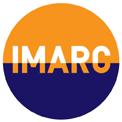

What is Holding Mining Innovation Back?
Australia’s leading mining and resource event, the International Mining and Resources Conference + Expo (IMARC), marked its 10th anniversary with unprecedented success in Sydney, setting the stage for its return in 2024
industry stems from psychological resistance, especially among longterm employees accustomed to traditional methods. This underscores the need for improved interpersonal skills to facilitate collaboration and
acceptance of new ideas. The panel also highlighted the importance of robust business operations for startups, noting a tendency to prioritize innovation over building a sustainable business model, thus hampering investment potential.
The panelists called for greater collaboration and openness in sharing information, criticizing the excessive use of Confidentiality Agreements that limit access to crucial market data and hinder innovation. They advocated for a more integrated approach, combining a clear understanding of market dynamics with practical problemsolving strategies. The conference, as a pivotal platform in Australia’s mining industry, was recognized for fostering discussions that bridge the gap between industry leaders and innovators, steering the sector towards sustainable progress.
Looking ahead, IMARC 2024 promises to be even more ambitious, set to be held at the ICC Sydney. The conference will continue to serve as a global platform for the mining and resources industry, facilitating discussions, business opportunities, and innovation. The successful execution of IMARC 2023 has set a high bar, showcasing Sydney’s capability to host world-class business events and the mining sector’s dynamic and collaborative nature.
The conference brought to the forefront critical challenges impeding innovation in the mining sector.
Experts emphasized the necessity for innovators to better articulate their stories and understand customer needs to attract investment. The discussion revealed that while Australia’s METS sector leads in engineering innovation, it falls short in effectively communicating its achievements to a broader audience. This gap in storytelling often results in innovative ideas being overlooked and not implemented.
A major hindrance to embracing new technologies within the


Empowering Africa’s Mining Renaissance through Collaboration
 Expert opinion: by COLLINS REX
Expert opinion: by COLLINS REX
Africa’s rich mineral resources have been a cornerstone of its economic and cultural identity for centuries. In recent years, the continent has witnessed a mining renaissance, a resurgence that has the potential to significantly boost economic empowerment and drive sustainable growth. This resurgence is largely due to the voracious world’s appetite for critical minerals such as cobalt, lithium, and rare earth elements that are essential for modern technologies like renewable energy systems,
electric vehicles, and electronics. Africa, with its rich mineral reserves, plays a pivotal role in the global supply of these minerals.
The continent’s vast untapped resources offer significant potential for the extraction and processing of critical minerals. However, this opportunity also comes with challenges, including the need for sustainable and responsible mining practices, investment in local infrastructure, and ensuring that the economic benefits support local communities. Africa’s strategic position in the global market for critical minerals will not only contribute to the continent’s economic development but also influence the worldwide transition to a more sustainable and technologically advanced future.
Africa is endowed with vast mineral wealth, ranking first or second in quantity of world reserves of bauxite, cobalt, industrial diamonds, phosphate rock, platinum-group metals (PGM), vermiculite, and zirconium. Recent statistics show that the mining sector contributes significantly to Africa’s GDP, with countries like South Africa, the Democratic Republic of the Congo (DRC), and Ghana being major players. The continent produces about 75% of the world’s platinum, over 50% of its diamonds, and significant proportions of base metals and coal. This sector employs millions of people across the continent, both directly and indirectly. Historically, Africa’s mining sector has been pivotal. From the ancient gold mines of Mali and Zimbabwe to the diamond fields of South Africa, mining has been intrinsically linked to the continent’s development. However, the sector has also faced challenges, including colonial exploitation and environmental degradation.


The legacy of these challenges still affects mining practices and perceptions today.
The mining industry in Africa has the potential to significantly drive economic empowerment. By creating jobs, fostering entrepreneurship, and generating revenue through exports, mining can be a catalyst for broader economic development. For example, Botswana’s diamond industry has transformed it from one of the poorest countries in the world to a middle-income nation. However, realising this potential requires effective governance, transparent management of revenues, and investment in local communities and infrastructure.
There is a strong link between economic empowerment and peace and prosperity. Economically empowered societies are more likely to enjoy stability and peace, as employment and wealth generation can reduce the likelihood of conflicts
over resources. Additionally, economic growth provides governments with resources to invest in social services, improving overall well-being and societal cohesion.
Soft diplomacy, involving noncoercive means such as cultural exchanges, education, and economic partnerships, can play a crucial role in mining. By fostering understanding and cooperation, soft diplomacy can help in creating sustainable and equitable growth in Africa’s mining sector. For instance, international collaborations can lead to the transfer of knowledge, skills, and technology, essential for environmental sustainability and social responsibility in mining practices.
Australia is a global leader in the mining sector, renowned for its innovation, efficiency, and sustainability practices. The Australian mining and METS (mining equipment, technology, and services) sector is at the forefront of developing and deploying cutting-edge

technology and services across the entire mine life cycle, from exploration to mine closure. This includes advancements in digital technology, environmental management, and workforce safety. Australia’s mining sector contributes significantly to its economy, demonstrating how effective governance and investment in technology can yield substantial benefits. Australian mining has also substantially improved its interactions with First Nations communities, resulting in increased prosperity in previously disadvantaged, remote settlements.
Collaborating with Australia presents numerous advantages for Africa’s mining renaissance. Australian expertise in sustainable mining practices, community engagement, and technological innovations can be invaluable in addressing some of the challenges faced by the African mining sector. For example, Australian experience in environmental rehabilitation and Indigenous community engagement can provide models for inclusive and sustainable mining practices in Africa. Furthermore, such collaboration can foster direct foreign investment, skills transfer, and enhanced access to global markets for African minerals.
Africa’s mining renaissance presents a unique opportunity for economic empowerment, peace, and sustainable development. To fully realise this potential, African nations can benefit from engaging in strategic partnerships and embracing soft diplomacy. Collaboration with a country like Australia, which has a robust and sophisticated mining and METS sector, can provide valuable insights and resources. Such partnerships, rooted in mutual respect and understanding, can lead to a prosperous future, not only for the mining sector but for the African continent as a whole. The path forward lies in harnessing the full potential of these resources through sustainable practices, good governance, and international cooperation, ensuring that Africa’s mining renaissance is a cornerstone of its overall development.
Secretary General Wamkele Mene’s Historic Visit to Australia Sets Stage for Africa-Australia Business Relations
The Secretary General of the African Continental Free Trade Area (AfCFTA) H.E. Wamkele Mene, undertook a pivotal official visit to Australia in October 2023, engaging in dialogues with key Australian institutions. This visit was crucial in laying the groundwork for the then-upcoming Africa-Australia Summit. Joined by esteemed members of the African Diplomatic Corps from various countries, Wamkele participated in a reception led by Ms. Lara Nassau of the Department of Foreign Affairs and Trade in Australia, focusing on setting the stage for fruitful discussions at the Summit.
The visit entailed strategic discussions with the Department of Foreign Affairs, led by Hon. Don Farrell, and major financial entities like Export Finance Australia and Macquarie Group. These conversations centred around enhancing trade and investment opportunities for African SMEs. Additionally, Wamkele’s engagement with the Sydney Marine Science Institute highlighted the potential of the Blue Economy, especially for African island states, and underscored his aspiration for concrete deals and impactful outcomes from the Summit.
Wamkele also addressed significant challenges within Africa, emphasizing the need to establish and enhance trade links, particularly among countries with larger economies. He expressed concerns about

 H.E Wamkele Mene
Farrell, Minister for Trade and Tourism of Australia
H.E Wamkele Mene
Farrell, Minister for Trade and Tourism of Australia
the adverse effects of coups on regional trade and underscored the detrimental impact of military regimes on development and informal trading. Highlighting the role of AfCFTA, Wamkele called upon African governments to lead in making capital available for businesses and private sectors looking to expand, emphasizing the importance of importing goods to improve food security.
The AfCFTA, a flagship project of the African Union’s Agenda 2063, represents the world’s largest free trade area, uniting 55 AU countries and eight Regional Economic Communities to create a single market. Launched in 2019 and commencing trading in 2021, AfCFTA aims to eliminate trade barriers, boost intra-Africa trade, and foster industrialization, job creation, and investment, thereby enhancing Africa’s competitiveness in the global economy. Wamkele Mene’s visit to Australia was a significant step in advancing these objectives and strengthening Africa’s trade relationships on a global scale.


Enhancing Africa’s Value in Global Value Chains
U.S. - AFRICA BUSINESS SUMMIT 2023 In-Depth Review
The 2023 U.S.-Africa Business Summit was a landmark event, marked by insightful discussions and strategic collaborations between U.S. and African leaders and business executives. Let me walk you through the highlights and key takeaways from each session.
The summit kicked off with a vital discussion on bolstering Africa’s manufacturing sector. Leaders emphasized the need for policy support and public-private collaboration to improve supply chains and strengthen small and medium enterprises. A focal point was the potential renewal of the African Growth and Opportunity Act, seen as crucial for continued economic partnership.
Empowering Women in Trade and Investment
The theme for this panel discussion was “Breaking Barriers, Shaping the Future: Women’s Leadership in Trade and Investment,” the event brought together influential voices from both the private and public

sectors to delve into the challenges and opportunities for women in intraAfrican trade and global commerce.
The USDTA Director Hon. Enoh Ebong, underscored the integral role of women in Africa’s economic growth, highlighting the stark funding gap faced by female entrepreneurs. “Women’s voices are heard at every level of our project management process”-
Despite being the largest demographic of entrepreneurs in Africa, women receive only a fraction of the necessary funding.
Addressing Finance Accessibility
Lerato Boakgomo-Ntakhwana of Gravitas Investments emphasized that while women understand finance, they often face barriers in accessing funds. She urged financial institutions to make funding more accessible and information more widespread.
Maureen Harrington of Standard Bank showcased their campaigns aimed at bridging this gap, with initiatives across several African nations focusing on digital training and supporting female entrepreneurship.

Visa’s Inclusivity Drive
Salvador Perez-Galindo highlighted the lack of banking access and smartphone ownership among African women, which impedes their financial inclusion. He called for less stringent financing conditions, particularly for informal traders in rural areas.
Build Confidence in Women through Education
Boitumelo Ntsosa, from Destiny Creek, spoke about the critical need for women to build confidence in their business ventures, often self-funded due to difficulty in demonstrating potential to investors. She stressed the importance of education about available opportunities.
Digital Solutions and Logistics
The panelists advocated for reliable and accessible mobile payment systems across Africa and education on mobile finances to enhance usage. Addressing logistical challenges was seen as key to facilitating trade and growth in the digital space.
Reflections
This discussion at the U.S.-Africa Business Summit highlighted the pressing need for more inclusive financial systems and educational initiatives to empower women in trade and investment. The panelists’ shared vision for a future where women’s leadership is recognized and supported in Africa’s trade and investment sectors is not just inspiring but a call to action for all stakeholders in the global economic landscape. The insights and recommendations from this panel shed light on the path forward to breaking barriers and shaping a more equitable future for women in business.
Infrastructure: Connecting Africa
Infrastructure plays a critical role in Africa’s economic growth. How can regional collaboration, accelerate infrastructure development through sustainable financing, and the need for technological integration like fiber optics to bolster industries like

agriculture and mining. The panel underscored the necessity of private sector engagement and appropriate project structuring to ensure commercial viability and attract investments. Aysha House from Millennium Challenge Corporation highlighted the use of data-driven strategies for investment, while Joseph Boateng Chief Investment Officer, Casey Family

Programs, emphasized mitigating risks and ensuring profitable returns to lure investors. The session concluded with a consensus on the critical role of leadership in fostering public-private partnerships, creating enabling environments, and driving Africa’s infrastructure development to connect and empower its value chains and economies.
Mineral Value Chains
A session on mineral value chains brought to light strategies for Africa’s enhanced participation in global mineral markets. The discussion centered around collaborative efforts for regional trade, the role of responsible mining practices in poverty alleviation, and the importance of sustainable, innovative governance models. Key points included the necessity for Africa to strike a balance between attracting foreign investment and maximizing local value addition. The session also addressed the need for investment in downstream mining value chains and the potential of local mineral processing to boost economies. Issues like the impact of automation on mining jobs, the risks of a global mineral monopoly, and the importance of diversification in supply chains were explored. The discussion emphasized that as Africa transitions towards mechanization and industrialization, it



must also focus on skills development and job creation, ensuring that new technologies supplement rather than replace human labor.
This session highlighted the imperative of Africa developing strong institutions, conducting market research, and promoting innovation to achieve sustainable economic growth in the mineral sector to integrate more effectively into global mineral markets.
Energy Transition to Net Zero
The conversation on sustainable energy and the transition to a net-zero economy was particularly impactful. Speakers highlighted the “importance of infrastructure risk management” and the utilization of renewable resources. The challenges and opportunities in regulatory frameworks were also discussed, underscoring the complexity of this transition.
Enhancing Africa’s Value in Agriculture
This session brought together leaders to discuss boosting Africa’s agricultural sector. The dialogue, focusing on collaborative strategies between governments and businesses, aimed to increase food production, job creation, and overall sector value. There was an emphasis on the necessity for agricultural solutions specifically designed for the African context, Jaco Beyers from John Deere noted that European models might not be suitable. He described John Deere’s innovative approach, which he likened to an “Uber for tractors,” highlighting their commitment to transforming farming practices in Africa.
Representatives from various sectors shared their experiences and perspectives on sustainable solutions for the industry. Key themes included the need for innovative governance,

investment in value addition, and empowering local communities and businesses. Basadi Molelelekeng, Managing Director at Bicolor Holdings highlighted the crucial role of women and youth in agriculture, emphasizing the need to change perceptions of farming and enhance access to resources and opportunities.
Overall, the panel explored ways to attract investment, foster growth, and improve profitability in agriculture, emphasizing its potential as a driver of economic growth in Africa.
African Health Care Capacity
The healthcare session was an eyeopener, with Botswana’s success in tackling HIV/AIDS being a case study. The need for “strengthening primary healthcare, enhancing diagnostic capacities, and preparing for future health challenges” was unanimously agreed upon.
Deepening U.S. - African Trade and Investment
A plenary on deepening trade ties called for “innovative financing and new mindsets for shared opportunities.” The role of small and medium-sized companies in this endeavor was highlighted as vital for developing robust value chains.
Sustainable Health Product Manufacturing
Focusing on health manufacturing capabilities in Africa, the session underscored the importance of “regulatory harmonization and enhancing local production capacity” to meet healthcare demands effectively.

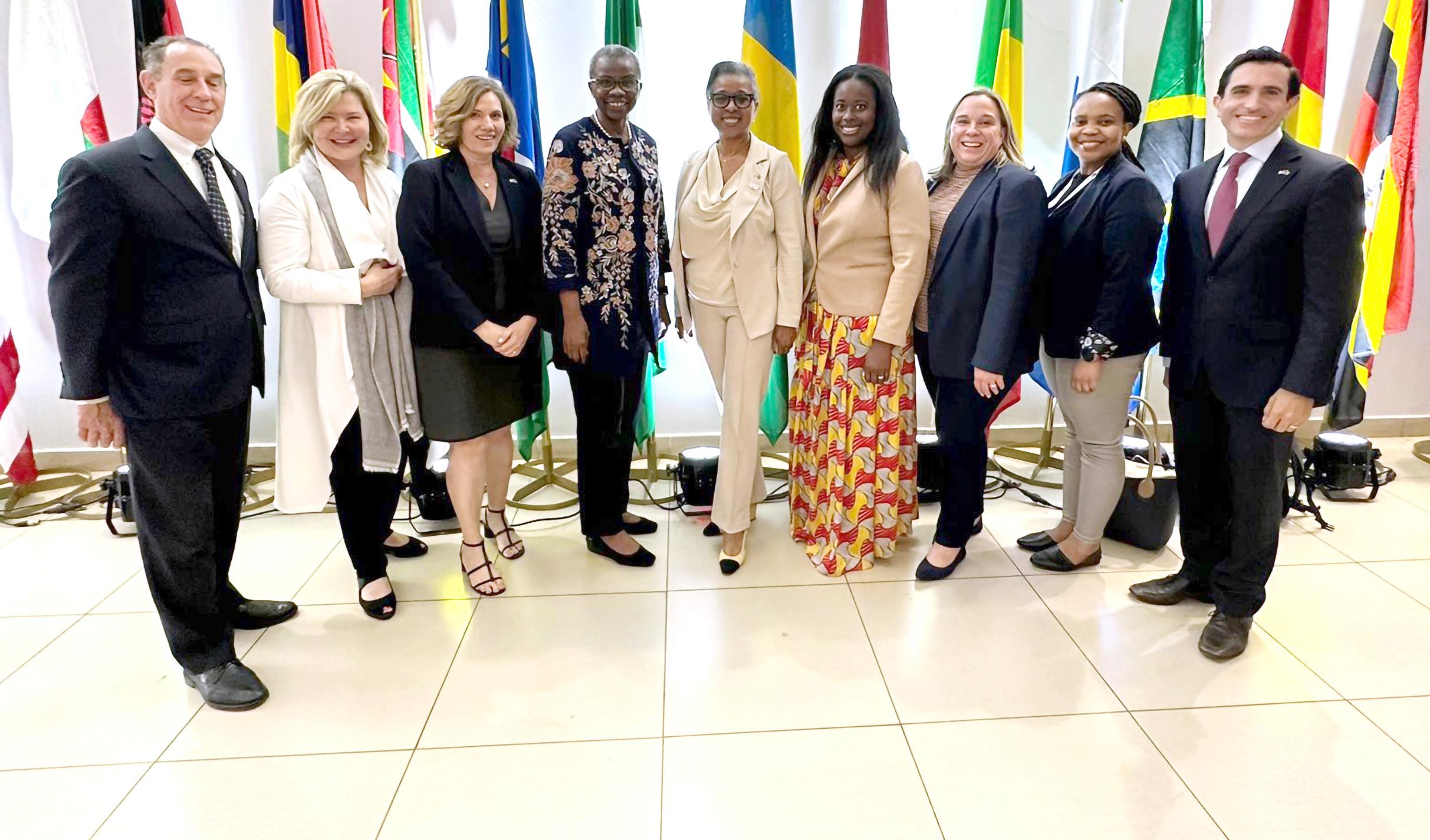
Ms. British A. Robinson (middle), the Coordinator for Prosper Africa
AGOA Private Sector Forum 2023
Insights and Future Directions for U.S. - Africa Trade
The African Growth and Opportunity Act (AGOA) is a significant United States trade act enacted in May 2000. It was designed to enhance market access to the US for qualifying SubSaharan African (SSA) countries. AGOA offers duty-free treatment for goods from designated countries in the SSA region, aiming to promote economic growth through good governance and open markets. This act represents a cornerstone of U.S. economic engagement with the countries of sub-Saharan Africa and is part of a long-term commitment with broad bipartisan support in the United States
The Corporate Council on Africa (CCA) in collaboration with the U.S.
Department of Commerce, the South African Department of Trade, Industry, and Competition, and various South African business organizations, organised the AGOA Private Sector Forum, marking a significant step in U.S.-Africa economic relations. The 2023 edition was held in November in South Africa and brought together prominent U.S. and African leaders from the public and private sectors. Over 600 companies, were present and the focus was on a variety of critical sectors, including agribusiness, apparel, automotive, health, and ICT, and addressed ways to enhance AGOA utilization and develop policies to strengthen U.S.-Africa trade and investment
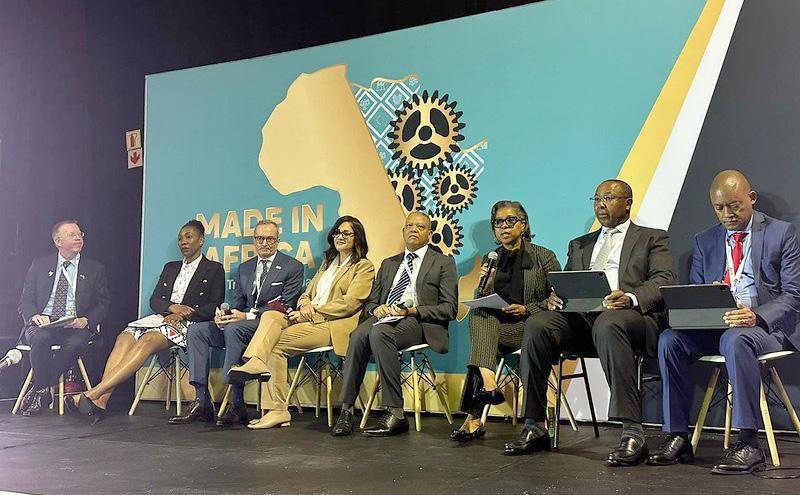
relationships before its impending expiration in 2025.
The consensus was unmistakable: AGOA’s renewal is not only necessary but should be extended for at least a decade to ensure continued economic synergy and growth. This renewal, seen as distinct from its predecessors due to the emergence of the African Continental Free Trade Area (AfCFTA), signifies a new era of opportunities and challenges in Africa’s trade and investment landscape.
KEY OUTCOMES AND RECOMMENDATIONS
AGOA’s
Role in U.S. - Africa Trade Growth
Recognized as a pivotal tool in expanding trade between the U.S. and Africa, AGOA has been instrumental since its enactment. However, there’s a consensus on the untapped potential to further elevate trade and investment.


The duty-free access provided by AGOA is vital for industries like textiles, apparel, and agriculture, enabling them to remain competitive globally.
The Imperative of AGOA Renewal
Renewing AGOA, preferably for a minimum of ten years, is deemed critical for continuity and investment attraction. This renewal is crucial for sectors dependent on AGOA for market competitiveness. The uncertainty surrounding AGOA’s future is affecting export businesses, with declines already observed in apparel exports.
President Biden’s endorsement of AGOA renewal has been wellreceived. This renewal is viewed differently due to the establishment of the African Continental Free Trade Area (AfCFTA), expected to create new opportunities and enhance Africa’s global trade competitiveness.
An “AGOA plus” approach is suggested, focusing on areas like services trade and ICT, critical minerals, and regulatory capacity building. Investing in value-added manufacturing in Africa is considered more crucial than exports alone.
Immediate Measures for AGOA’s Efficacy
Better data collection to understand sectoral performance and regional integration is recommended. Including all AfCFTA member states
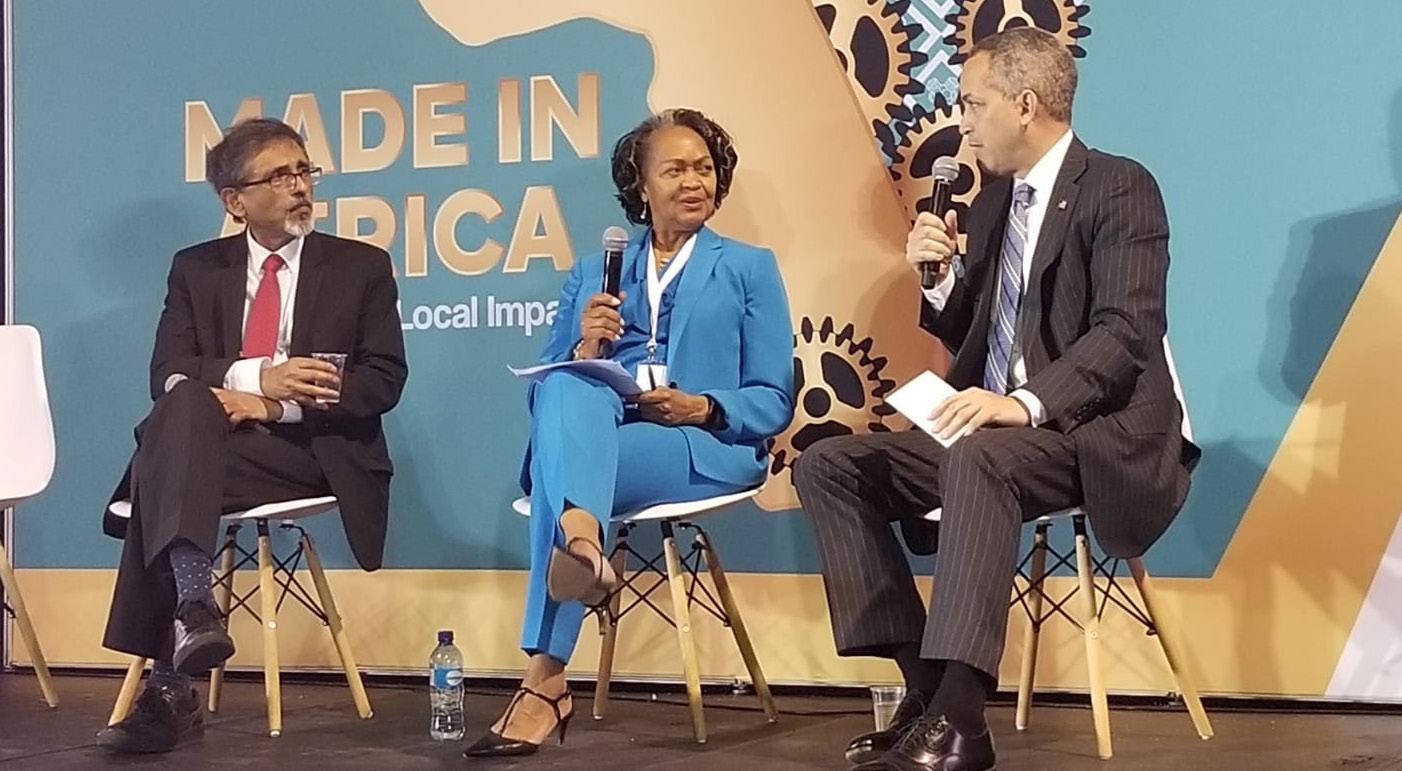
and improving data usage for targeted capacity-building efforts are seen as key to enhancing AGOA’s effectiveness.
Strengthening connections between U.S. and African associations and companies is vital for mutually beneficial business deals. AGOA is viewed as a critical, but not sole, tool for strengthening U.S.-Africa trade and investment relations.
Recommendations for AGOA Renewal: Early and Long-Term Renewal
Urgent renewal of AGOA is needed to sustain industry investment and planning. The industries reliant on AGOA operate on biennial cycles, necessitating immediate action to avoid scaling back. A long-term renewal beyond ten years is essential for strategic planning and vertical integration in Africa.

Strategic and Policy Implications
AGOA renewal aligns with U.S. strategic goals in Africa, particularly in counterbalancing China’s presence and supporting economic integration under AfCFTA. Extended AGOA would bolster African economic reforms, digital transformation, infrastructure investment, and a conducive business climate for U.S. investments.
“Since the digital economy is a multiplier of economic growth across many other industries, a revamped AGOA could help unleash the full potential of Africa’s burgeoning market,” says Daniel F. Runde - Senior Vice President.
Enhancements for AGOA’s Success
Targeted enhancements, without delaying renewal, include harmonizing eligibility reviews, allowing cumulation from AfCFTA members, modernizing textile visa requirements, adjusting apparel quotas, and modifying graduation criteria for AGOA countries.
This forum underscored the crucial role of AGOA in shaping the U.S.-Africa trade landscape and highlighted the need for its timely renewal and strategic enhancement. The discussions and recommendations from the AGOA Private Sector Forum 2023 are set to guide future trade dynamics and foster stronger U.S.-Africa economic ties.

Finance and Technology
Accelerating Economic Partnerships between Africa and Singapore
AFRICA - SINGAPORE BUSINESS FORUM ASBF2023 Review
The Africa Singapore Business Forum 2023 (ASBF) concluded in August, aimed at capturing opportunities in manufacturing, the digital economy, and sustainable development.
The Africa Singapore Business Forum (ASBF) 2023, held on 31 August, brought together over 500 delegates, primarily from Africa and Singapore, to foster business exchanges and thought leadership. This forum underscored the significance of partnership, connectivity, and regional collaboration as vital components for mutual growth.
Key Takeaways from the Forum: Emphasizing Partnerships for Growth
Mr. Gan Kim Yong, Singapore’s Minister of Trade and Industry, in his keynote address, underscored the adage, “To go far, go together.” Highlighting the imperative of partnerships and connectivity between Singapore and Africa.
With Africa accounting for only 2.2% of Southeast Asia’s global trade, Mr. Gan emphasized the growth potential, noting Singapore’s efforts to deepen bilateral ties and encourage ventures in Africa.
Africa’s Digital and Economic Potential
Juliana Rotich, Head of Fintech Integrations at Safaricom Financial Services, discussed Africa’s digital surge driven by improved infrastructure, access to credit, and increased business activities. The forum highlighted the role of AI in enhancing productivity, with Singapore Agritech company Olam using AI to boost crop yields in Africa.

‘‘Go far and grow together’’

Borderless World: Opportunities and Regulations
Malini Kannan, COO of Thunes, a Singaporean cross-border payment company, emphasized the importance of understanding local regulations to tap into Africa’s booming mobile money market.
Green Growth and Sustainable Development
Despite Africa housing vast unused arable land and untapped hydroelectric power, the continent faces challenges in attracting green financing.
Panelists in the “Africa’s Green and Sustainable Development” session discussed the role of carbon credits in fostering financial opportunities and long-term sustainability.
The panel also addressed gender equality, with Julie Greene, Chief Sustainability Officer of Olam, advocating for equal opportunities to enhance women’s productivity in agriculture.
Enhancing Economic Collaboration in an Evolving Landscape
A panel discussion focused on enhancing economic collaboration between Africa and Singapore, recognizing the need for businesses to adapt to market shifts and foster resilience through stronger bilateral collaborations.
Reflections
The ASBF 2023 encapsulated a vision of a collaborative future between Africa and Singapore, highlighting the potential of digital innovation, sustainable development, and gender equality. It served as a platform to discuss strategies to overcome challenges and seize opportunities in an increasingly interconnected world. The insights from this forum offer a roadmap for businesses looking to navigate and leverage the synergies between these dynamic markets.

Financial Inclusion in Africa
IN CONVERSATION WITH DR. JAMES MWANGI
A fireside chat featuring Dr. James Mwangi, Group Managing Director and CEO of Equity Group Holdings, offered invaluable insights into facilitating financing from Asia into Africa. The discussion was expertly facilitated by Karim Anjarwalla a Senior Partner at ALN Kenya. It focused on how financial institutions and fintech can enhance financial inclusion for both businesses and individuals engaging in African markets.
During the conversation, Dr. Mwangi shed light on the significant strides being made in the African financial landscape. He emphasized the crucial role of innovative financial solutions in empowering businesses and individuals across the continent
Dr. Mwangi’s expertise in the banking sector provided a profound understanding of the challenges and opportunities within African markets. His insights on the importance of financial inclusion as a catalyst for economic development were particularly enlightening. The session highlighted the growing importance of fintech in bridging financial gaps and the potential for Asian investment to further accelerate this progress.

Human Capital in Africa: A Paradigm Shift
The dialogue initiated a conversation about the quality of human capital in Africa, particularly in Kenya. There’s a common perception that local human capital in African countries like Kenya is inadequate for running businesses, necessitating the import of foreign expertise. However, examples from the financial sector, like Equity Bank, debunk this myth. Equity Bank, using local skills and knowledge, has emerged as a leading financial brand in Africa. The discussion highlighted the need for sophisticated data management and technical skills, which are critical for sectors like banking. The forum also touched upon how Africa is investing in its human capital, drawing inspiration

from Singapore’s model of focusing on the top percentile for education and professional development.
Case Study: Kenya as a Gateway to Africa
Kenya’s role as a regional hub and gateway to Africa was another key topic. The discussion emphasized that Kenya should not be viewed merely as a country with 57 million people but as part of the larger East African Community, representing a market of 120 million people. Kenya’s developed human capital, robust infrastructure, and clean energy sources make it an ideal gateway for foreign businesses looking to explore opportunities in Africa. Additionally, the country’s strong democratic institutions and governance were highlighted as key factors contributing to its economic stability and growth.
Future Prospects and Opportunities
The conversation concluded with a forward-looking perspective, emphasizing Africa’s potential as a continent ripe with opportunities for global diversification and solutions to broken supply chains. The discussions pointed to Africa’s assertiveness in the global market and its readiness to defy the old order. The conversation underscored the importance of joining and working with Africa to be part of its transformative journey.


Singapore FinTech Festival 2023
A Convergence of AI, Innovation, and Sustainable Finance AI
The eighth edition of the Singapore FinTech Festival (SFF), held from November 15 to 17, 2023, marked a significant milestone in the FinTech industry, convening global leaders from finance, technology, and public policy. With a record attendance of 66,000 participants from 150 countries, the festival focused on the theme “AI for good. AI for good?”, exploring the transformative impact of Artificial Intelligence (AI) in the financial sector and beyond.
AI’s Transformative Role and Ethical Dimensions: The festival delved into AI’s potential to revolutionize financial services while addressing inherent risks such as bias and privacy concerns. The Monetary Authority of Singapore highlighted AI’s capacity to significantly boost global GDP,
with AI’s role in achieving the UN Sustainable Development Goals also emphasized. The discussions navigated the balance between harnessing AI’s benefits and mitigating its risks, considering ethical and regulatory implications.
Focus on Sustainable and Inclusive Finance: SFF 2023 explored AI’s compelling potential in elevating financial services and reshaping the sector’s architecture. Key topics included AI’s role in transitioning to a low-carbon future, enhancing financial inclusivity, and addressing modern risks like climate change and cyber threats. The festival’s thematic zones offered insights into technological advancements, ESG frameworks, and regulatory compliance, reflecting the dynamic landscape of financial technology.
Looking Ahead to SFF 2024:
Building on the success of SFF 2023, preparations are already underway for the next edition of the festival, scheduled from November 6 to 8, 2024. Anticipated to be even more expansive, SFF 2024 will continue to foster global connections and facilitate discussions that drive innovation and sustainability in the FinTech sector. Elevandi Insights, set for November 4 to 5, 2024, will precede the main event, serving as a forum for in-depth industry analysis and collaboration.
In summary, SFF 2023 not only celebrated advancements in FinTech but also reinforced the festival’s role as a crucial global platform for industry leaders, policymakers, and innovators. It provided comprehensive insights into AI’s role in finance, focusing on ethical considerations, sustainable development, and inclusivity. As the festival looks forward to its next edition, it promises to further enrich dialogues and collaborations that shape the future of finance in an increasingly digital world.


AI and Technology Catalysts for Africa’s Economic Renaissance
Africa, with its vast resources and untapped potential, is experiencing a surge in economic growth and development, largely fueled by technological advancements. The emergence of Artificial Intelligence (AI) across the continent is particularly noteworthy, promising significant impacts on various industries.
Tech and AI Landscape in Africa: A Surge in Mobile Connectivity
According to the International Data Corporation, Africa is the fastestgrowing mobile market globally, thanks to increased smartphone availability and improved internet quality. This digital leap has led to a spike in mobile internet users, fostering a fertile ground for technological innovations. Notable tech hubs have emerged in Nigeria, Kenya, and South Africa, attracting both local and international investments.
AI’s Role in Diverse Sectors
The application of AI in Africa is projected to add $45 billion to its GDP
by 2030. This growth spans multiple sectors:
1. Healthcare: AI-driven solutions like Kenya’s Flare for ambulances and South Africa’s Rethink Education are revolutionizing emergency response and learning, respectively.
2. Agriculture: Startups like Aerobotics leverage AI for realtime crop health monitoring, enhancing agricultural productivity.
3. Finance: AI algorithms in fintech have broadened financial accessibility, with services like Kenya’s M-Pesa revolutionizing transactions.
4. Education: AI-driven e-learning platforms, such as Kenya’s M-Shule, offer personalized educational experiences, especially vital for remote areas.
5. Transportation: AI optimizes road safety and public transit efficiency, with services like
Uganda’s Safe Boda and Nigeria’s Bolt employing AI for route optimization.
6. Renewable Energy: AI technologies like M-Kopa Solar in East Africa harness renewable resources more effectively, bringing sustainable energy to off-grid communities.
Challenges and the Road Ahead
Despite AI’s potential, Africa faces challenges like skill shortages, infrastructural limitations, and privacy concerns. Strategic efforts by governments and NGOs are essential to develop AI infrastructure and expertise. McKinsey estimates that by 2030, AI could contribute up to $148 billion to Africa’s economy, indicating a transformative impact on various sectors and the potential for Africa to emerge as a technological leader.
With the right policies and investments, Africa is poised to harness AI’s capabilities fully, driving its economic growth and innovation. Embracing AI and technology is crucial for Africa’s economic future, necessitating a focus on both research and practical applications by national and international entities. Africa stands at the cusp of an economic revolution, with AI and technology as its driving forces.
Digital Transformation in Sub-Sahara Africa
 Writer: Lawrence Baraza
Writer: Lawrence Baraza
Sub-Saharan Africa is experiencing a digital revolution, with mobile broadband usage and internet accessibility skyrocketing. In 2022, internet users in Africa doubled from the number in 2015, reaching over 570 million. Notably, in 2019, mobile technologies and services contributed an impressive $155 billion to the region's economy. Predictions indicate that mobile connections in Africa will double by 2025, showcasing a significant digital leap in countries like Cameroon and Kenya, which have seen internet penetration increases of 123% and 114%, respectively, since 2010.
The COVID-19 pandemic accelerated this digital shift, pushing millions of Africans towards e-commerce and internet platforms for essential services and goods. This surge in digital engagement presents substantial opportunities for businesses across the continent.
Expert Insights on Digital Impacts
Michael Agwanda, a Kenyan Data Communications Analyst, emphasizes the crucial role of digital transformation in modern business operations. “No business worth its salt can ignore the cost implications of digital transformation. Digital
technology, in my view, represents a vast repository of knowledge. This widespread awareness translates into interest in products, which is the starting point for potential profitability. The volume of digital trade underscores both the profitability and the global nature of business. It transcends borders without physically doing so, as digital operations cross these borders on behalf of the business," explained Agwanda
Digital Transformation Beyond Tech Companies
The digital wave is not confined to tech firms alone. Businesses of all sizes, including small-scale vegetable farmers, are adopting digital platforms to improve efficiency, customer experience, and revenue generation. This shift enables businesses to make informed decisions, enhancing their resilience and agility. “We live in a digital world, and it is only logical that our transactions mirror this reality. A country that does not invest in digital technology risks being left behind. Digital investment is not just about financial resources; it’s about investing in the future, in the brains that will drive innovation and progress,” added Agwanda.
The Rise of Africa’s Digital Economy
The European Investment Bank (EIB) has significantly contributed to Africa's digital economy, with €2.5
billion in investments over the last five years. This funding has primarily supported private sector companies in infrastructure and innovative digital solutions. EIB's commitment to digital transformation reflects the importance of inclusive transition and the dissemination of economic and social benefits. “The long-term digital transformation of Africa’s economies and societies is profound and support and financing are required to ensure an inclusive transition and wide dissemination of the economic and social benefits,” said EIB in its Rise of Africa’s Digital Economy in Africa report
US Tech Giants in Africa
In a landmark partnership, Microsoft teamed up with M-PESA Africa to advance digital capacity building and digitization for Micro, Small, and Medium Enterprises (MSMEs) across Africa. This collaboration aims to digitally enable 10 million SMEs in Africa, emphasizing the vital role of digitization in enhancing financial inclusion and economic growth. “Digitisation can significantly enhance financial inclusion, most particularly for unserved and underserved enterprises such as MSMEs. Creating an enabling environment for these important economically active businesses that help them thrive and participate actively in the continent’s economies is essential for sustainable and inclusive economic growth.
We are proud to be at the forefront of driving MSME development and financial inclusion in Africa and we look forward to seeing the positive impact of our partnership with M-PESA Africa across the continent,” says Gerald Maithya, Managing Director, of Africa Transformation Office, Microsoft.
The Future of Digital Transformation in Africa
Africa's digital landscape is rapidly evolving, offering unprecedented opportunities for economic growth and development. Investments in digital infrastructure and the embrace of digital technologies are crucial for the continent's future. With tech giants like Microsoft leading the way, Africa is wellpositioned to harness the full potential of digital transformation for sustainable and inclusive growth.
Africa’s Path to Food Security and Sustainable Development

Africa’s projected population growth to approximately 2 billion by 2050 necessitates a 70% increase in global food production, with a focus on enhancing farm productivity in the continent. Recognizing this, African nations are actively integrating digital solutions to revolutionize their agricultural sector, aligning with the African Union’s Agenda 2063 and the Comprehensive African Agricultural Development Programme (CAADP).
African Nations Embracing Digital Agriculture
• Kenya: The country is pioneering in the use of mobile farming applications, such as FarmDrive and iCow, which provide farmers with critical information on weather, market prices, and agricultural best practices. Apollo Agriculture is a notable example, leveraging satellite data and machine learning to offer financial products and farming inputs.
• Nigeria: The e-wallet system introduced by the government has revolutionized the way farmers access subsidies and inputs. AgriTech platforms like Farmcrowdy and Hello Tractor are facilitating connections between farmers and investors, and providing access to farming equipment and knowledge.
• Ghana: Utilizing satellite technology, Ghana is enhancing its agricultural practices, particularly in crop health monitoring and land use assessment. The use of mobile money platforms is streamlining financial transactions for farmers.
• South Africa: Here, smart irrigation systems are being adopted to optimize water usage. South African farmers are also exploring blockchain technology to improve transparency in the agricultural supply chain.
• Ethiopia: The country is focused on improving agricultural extension services through ICT, and is exploring weather index insurance to mitigate climate-related risks.
• Rwanda: Known for its use of drone technology in agriculture, Rwanda is at the forefront of using drones for crop monitoring and disease detection. The country is also establishing smart agriculture hubs to drive innovation.
• Senegal: Embracing solar-powered irrigation systems, Senegal is addressing water scarcity and enhancing productivity. Digital market platforms are also playing a crucial role in connecting farmers with markets.
Overcoming Agricultural Productivity Challenges
Despite significant growth, Africa’s agricultural sector faces challenges
like limited adoption of modern technologies, climate change impacts, poor infrastructure, and restricted market access. To address these issues, countries are focusing on agricultural research and development. For instance, Kenya’s investment in agricultural R&D through institutions like the Kenya Agricultural and Livestock Research Organization (KALRO) is a step in the right direction. Similarly, Tanzania is making progress through its Tanzania Agricultural Research Institute (TARI).
Role of Digital Technologies in Transforming Agriculture
Digital technologies are pivotal in transforming the agricultural landscape of Africa. These technologies, ranging from mobile applications to satellite and drone systems, are aiding in efficient farming practices, logistical management, and enhancing input delivery processes. The African Union High-Level Panel on Emerging Technologies (APET) advocates for the adoption of these digital tools to revolutionize agriculture.
Investing in the Future of African Agriculture
The GSMA AgriTech program stresses the importance of investments in digital infrastructure and training to fully realize the potential of Agritech in Africa. Despite initial hesitance, the increasing venture capital investments in 2022 indicate a growing confidence in the sector. To sustain this momentum, it is crucial to foster collaboration between governments, private sectors, and technology providers, and establish supportive policies and regulatory frameworks.
A Vision of Sustainable and Productive Agriculture
The future of African agriculture is increasingly intertwined with technological advancements. By embracing digital technologies, African nations can boost their agricultural productivity, ensure food security, and contribute to sustainable development. Strategic investments in digital infrastructure, capacity building, and publicprivate partnerships are essential to unlocking the transformative potential of agriculture technology in Africa.
EGYPT

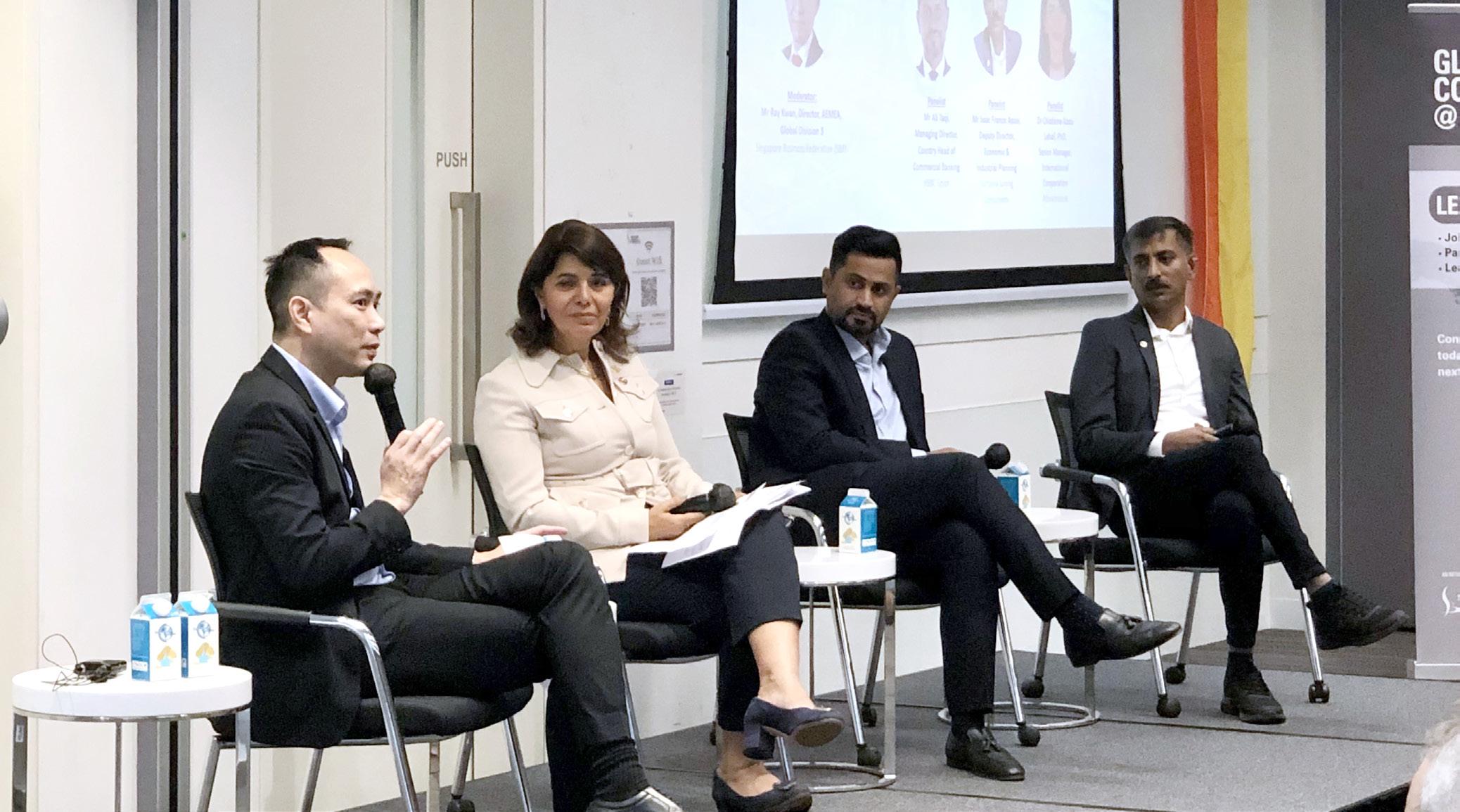
Egypt Business Connect was an event hosted in collaboration with the Singapore Business Federation (SBF) and HSBC Egypt. Set against the backdrop of the Africa-Singapore summit, the event echoed the myriad of business opportunities and growth trajectories that Egypt presents.
Egypt’s Strategic and Economic Positioning
Egypt is uniquely positioned as a gateway to not only the Middle East and Africa but also Europe. Its robust infrastructure and historic trade connections have established it as a crucial hub for trade and investments. Egypt, with a population exceeding 100 million, offers a vast consumer market. The country has been spotlighted for growth in diverse sectors, including energy, industry, agribusiness, healthcare, education, ICT, logistics, and tourism.
Investment Climate and Opportunities
Egypt’s investment climate is evolving to become more competitive and attractive for businesses. This transformation is spearheaded by significant updates to the legislative framework and efforts
to simplify business processes. The seminar highlighted the country’s commitment to showcasing investment opportunities on digital platforms and facilitating business operations through investor service centers scattered across the nation.
GAFI’s Central Role in Egypt’s Investment Landscape
The General Authority for Investment & Free Zones (GAFI) plays a pivotal role as Egypt’s primary investment promotion authority. GAFI is instrumental in guiding businesses
exploring Egyptian markets, ensuring they have the necessary support and information to establish and grow their ventures successfully.
The Promise of Human Capital in Egypt
Egypt boasts a significant asset in its human capital, especially its youthful population. This demographic is not only well-educated but also possesses multilingual capabilities, with proficiency in languages such as English, French, Spanish, German, and Mandarin. This positions Egypt as

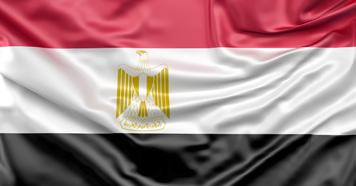
an ideal location for sectors driven by technology and innovation, including fintech.
Regulatory Revamps to Boost Investment
Egypt is proactively streamlining business procedures, establishing dedicated investment centers, and creating an environment conducive to Foreign Direct Investments (FDIs). These efforts are aimed at significantly increasing FDIs, with targets surpassing 20 million USD.
Enhancing Logistics and Infrastructure
Egypt is making strides in bolstering its logistics sector through the efforts of the Supreme Council for Logistics. This includes initiatives in port management, electro-train operations, and the development of logistic hubs. Moreover, a collaboration with Changi Airport Group to upgrade Egypt’s airport facilities indicates the country’s commitment to matching its infrastructure with its growth ambitions.
Navigating Risks in Egypt’s Vibrant Economy
While Egypt has a notable informal sector, it is characterized by its vibrancy and potential. Understanding and managing the inherent risks in this sector can unlock significant rewards for investors.
Investment Guidance and Support
GAFI stands as a crucial ally for investors, providing guidance and forming local alliances to support investment endeavors. Organizations like Afreximbank, an integral part of the African Development Bank (AfDB) based in Cairo, are instrumental in providing financial support to exporters.
Infrastructure Development: A Sign of Reliability
In Egypt, infrastructure maintenance is more than just a routine activity; it’s a testament to the country’s reliability and commitment to growth. This approach not only enhances the functionality of existing facilities but

also builds trust among investors, paving the way for sustained economic development
Incentives and Support for Investors
Egypt offers a comprehensive package of incentives for foreign investors. These include significant tax credits, reductions in customs duties, and investment cost rebates. Additional incentives are geared towards export-oriented projects, technology transfer, and research and development initiatives. The government guarantees fair treatment of foreign investors, including rights for profit repatriation and foreign labor employment.
HSBC’s Strategic Involvement
HSBC’s significant presence in Egypt as the foremost multinational bank underscores the country’s appeal to foreign investors. The bank’s engagement in key sectors mirrors
Egypt’s growth ambitions, making it a priority market. HSBC’s involvement provides vital support for businesses venturing into the Egyptian market.
Key Statistics and Growth Indicators
• In 2022, Egypt witnessed $22.2 billion in foreign direct investment inflows, indicating a robust and growing economy.
• The net FDI, excluding the petroleum sector, was reported at $8.9 billion.
• A notable increase of 71% in net FDI was observed, showcasing the effectiveness of government enhancements in business laws and regulations.
• The Egyptian economy aims to double the private sector’s share in the next four years, targeting billions of dollars in investment. Egypt envisions its industry sector to contribute 60% to the GDP in the next seven years.

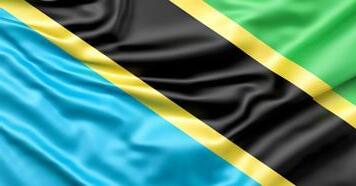
Tanzania’s Strategic Vision Reconciliation, Resilience, and Reform

Comparative Analysis of Connectivity and Cost Efficiency
Tanzania shows a competitive edge in connectivity and cost efficiency in utilities, particularly in comparison to neighboring countries like Kenya, Uganda, Rwanda, and Burundi. This is evident in the comparative costs of electricity (US¢/kWh), where Tanzania demonstrates lower rates, thus offering a costefficient environment for business operations.
One-Stop Facilitation Center
To streamline the investment process, Tanzania has established a OneStop Facilitation Center. This center simplifies procedures for obtaining essential documents and permits, including residence permits, work permits, company incorporation, industrial and business licenses, taxpayer identification, land derivative rights, product standard certificates, environmental compliance, and more. This initiative significantly eases the process for investors and businesses looking to establish or expand in Tanzania.
Innovative Investment Promotion and Institutional Quality Improvement
Tanzania's national strategy unfolds an intriguing narrative backed by key data points, highlighting the country's commitment to profitability, connectivity, and sustainable reforms. The strategic focus is on developing a robust infrastructure, enhancing economic resilience, and fostering a business-friendly environment.
Infrastructure and Connectivity as Growth Pillars
Tanzania has invested significantly in infrastructure development, with 2000 km of railroads, advancements in electrification, and ICT. These developments are pivotal in expanding the landscape of opportunities across the country, reducing logistical costs, and
positioning Tanzanian cities as regional hubs in the North, Lake, South, and Central regions.
Economic Fundamentals and Cost Efficiency
The country boasts solid economic fundamentals, with a 4% inflation rate and strong policies in monetary and fiscal discipline. This stability contributes to lower average production costs in labor, utilities, and power, simultaneously enhancing disposable income growth. Key growth sectors include Fast-Moving Consumer Goods (FMCG), urbanization, financial services, tourism, and logistics, demonstrating economic growth despite relatively low levels of export growth.
Tanzania is leveraging technology through initiatives like the TZ Investment Window and employing data-driven promotion strategies such as monthly bulletins. The country offers personalized investor sessions and has targeted outreach to select markets, pivoting towards Asia. Unique incentives and improved institutional quality, with the investment portfolio elevated to the President's Office, underscore Tanzania's commitment to attracting and facilitating foreign investment.
Tanzania's strategy is to create an attractive destination for investment, characterized by robust infrastructure, economic stability, and a business-friendly environment. The strategic initiatives and reforms implemented are set to propel Tanzania towards sustainable growth and development.

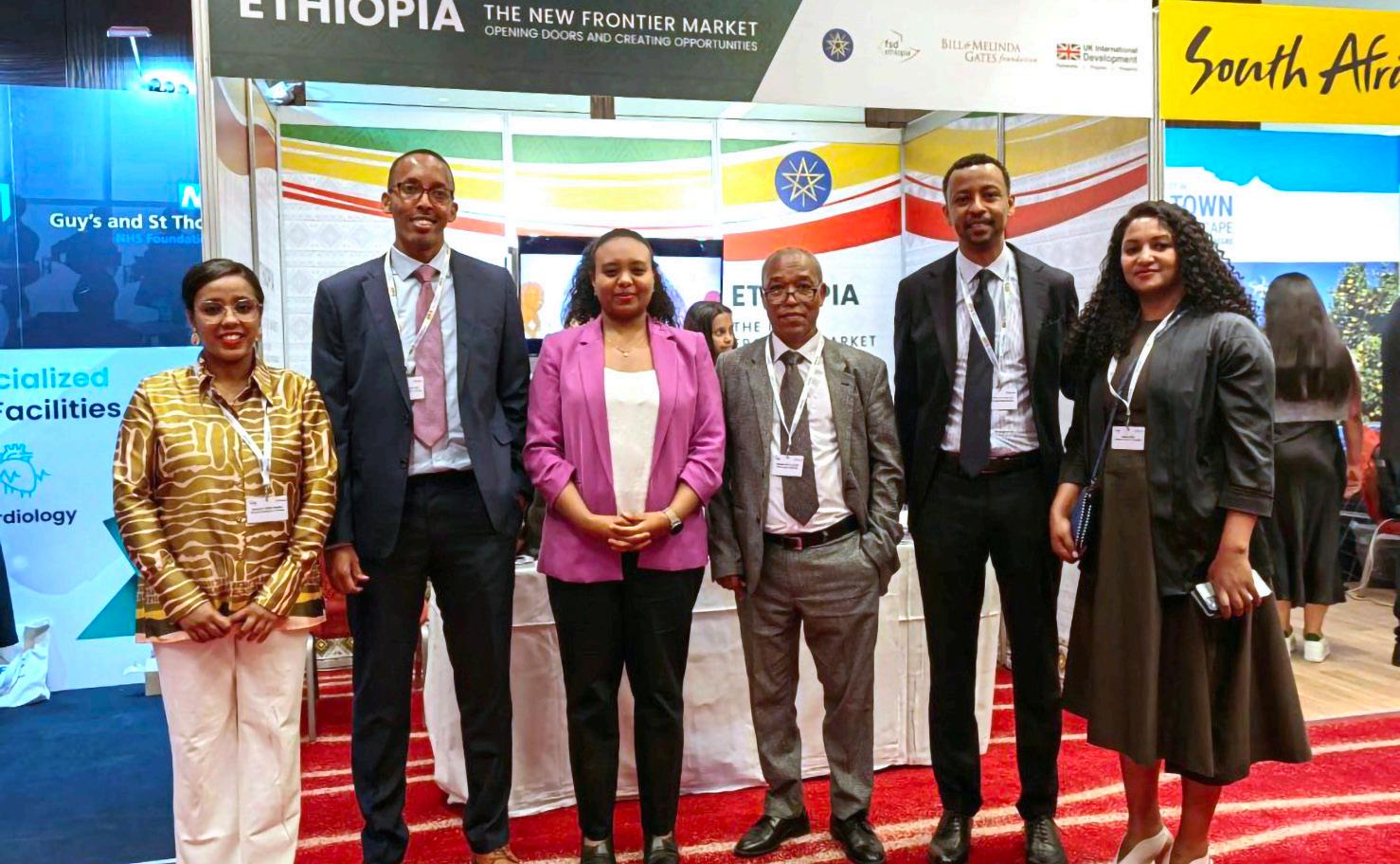
Ethiopia An Attractive Destination for Foreign Direct Investment
Ethiopia, strategically positioned in the Horn of Africa, is a pivotal gateway connecting the continent to global markets. As home to numerous international and multinational organizations, including the African Union and the United Nations Economic Commission for Africa, Ethiopia stands as a central hub for diplomatic and economic activities in the region
Ethiopia, is renowned for its sustained economic growth and stability, emerging as a leading destination for Foreign Direct Investment (FDI) in Africa. The Ethiopian Investment Commission (EIC), an autonomous government institution, has been pivotal in this journey, attracting over $4.1 billion in FDI in 2021 across various sectors.
Why Invest in Ethiopia?
1. Dynamic and Growing Economy: Ethiopia has been the fastestgrowing economy in Africa for the past 15 years, marked by a resilient and inclusive growth model. This growth is underpinned by a committed government implementing a business-oriented reform agenda.
2. Strategic Location and Market Connectivity: As Africa's secondlargest consumer market, Ethiopia serves as a gateway to regional and global markets. This strategic positioning is enhanced by an ambitious infrastructure development plan, including railways, ICT, and energy projects.
3. Diverse Investment Sectors: Investment opportunities span across multiple priority sectors such as agriculture, manufacturing, mining, ICT, and tourism. Other sectors like energy, health, transport & and logistics, telecom, financial services, and privatization offer additional avenues for investment.
4. Special Economic Zones (SEZs): Ethiopia has established both public and private SEZs, offering
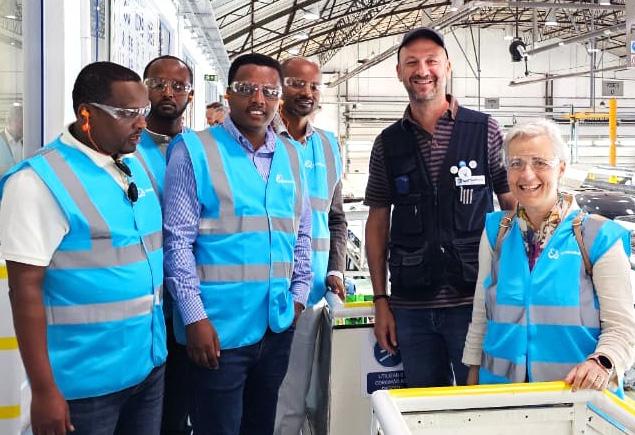
a conducive environment for businesses with various incentives and facilitations.
5. Resource-Rich Nation: The country's vast and varied mineral reserves are supported by a modern governance and legal framework, facilitating their extraction and commercialization.
6. Competitive Workforce: With a labor force of 56 million, Ethiopia boasts Africa's second-largest pool of workers. The workforce is young, fast-learning, and productive, offering a significant advantage to businesses.
Investment Climate and Incentives
• Ethiopia offers attractive incentives for investors, including tax holidays, capital gains exemptions, and duty-free imports of machinery and construction materials.
• The EIC, working under the Ethiopian Investment Board chaired by the Prime Minister, has been instrumental in creating a conducive investment environment.
• Recognitions such as the Gold Award of the WAIPA-World Bank and the Global ‘Star Reformer’ Award from the World Bank Group underline EIC’s effectiveness in investment promotion.
Ethiopia's Vision for Growth
• The country is on a transformative journey to become a high-income economy, leveraging its regional hub status.
• Key initiatives include Kigali Innovation City and Kigali International Financial Centre, aiming to position Rwanda as a technology and business outsourcing hub.
Ethiopia's combination of a dynamic policy environment, resilient economy, and strategic location, alongside its rich resources and competitive workforce, make it an ideal destination for investors looking to start or expand operations in Africa. The EIC’s ongoing efforts to improve the investment climate further solidify Ethiopia’s position as a top FDI destination in the region.
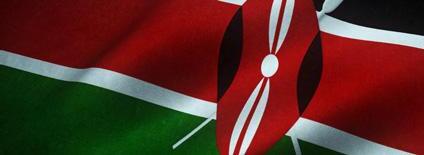

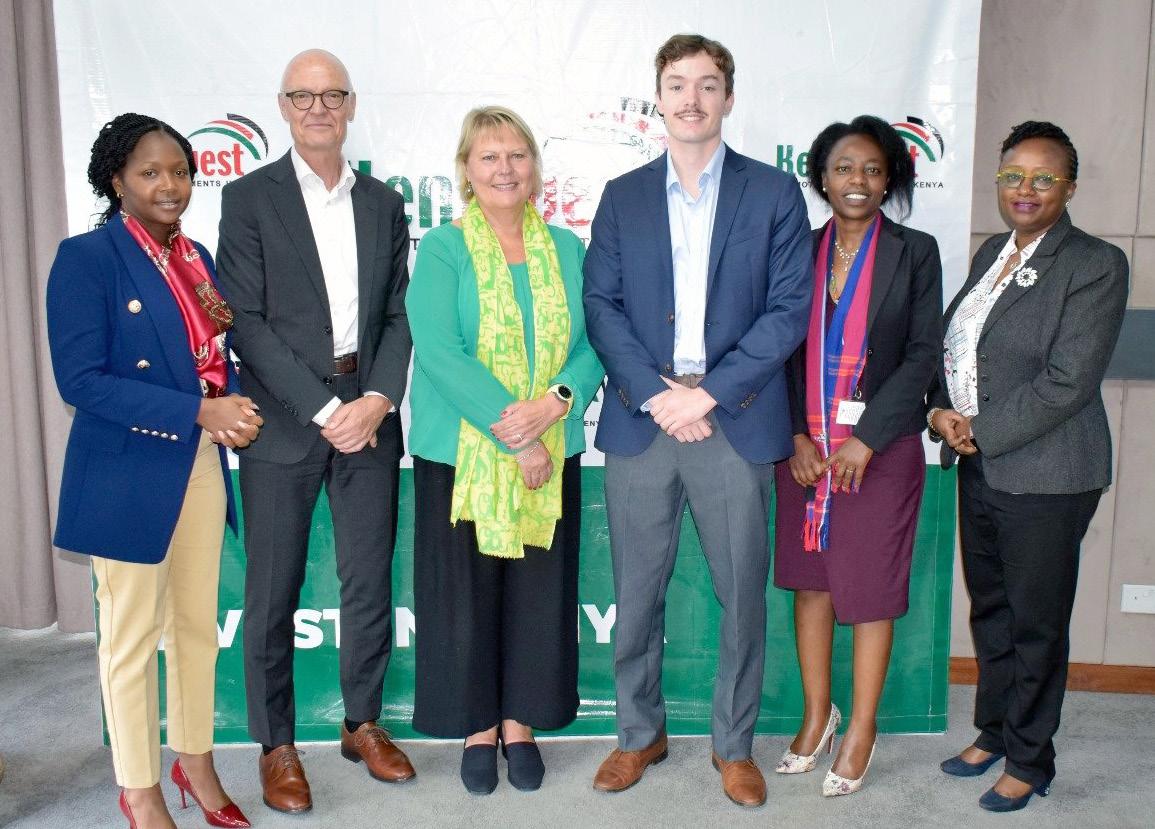
June Chepkemei-MD, KenInvest with Gunnar Adreas,Norwegian Ambassador to Kenya
Digitization: Revolutionizing Government Services and Tech Innovation in Kenya Government Services Go Digital Kenya's government has made significant strides in digitizing its services, and streamlining processes for investors and citizens alike. This transformation includes:
Kenya at a Glance
A Regional Economic Powerhouse
KENYA: YOUR STRATEGIC INVESTMENT DESTINATION IN EAST AND CENTRAL AFRICA
Nairobi: The Heart of Multinational Corporations and United Nations Headquarters
Kenya, one of the top economies in sub-Saharan Africa, stands as a regional economic hub and a host to over 200 multinational corporations. Nairobi, the vibrant capital, is not only home to regional and continent-wide headquarters of these corporations but also serves as the base for the United Nations’ African headquarters (UNON), UNEP, and UN-Habitat. The country's robust financial system includes 43 banking institutions, numerous microfinance banks, and a range of money remittance and forex services. With a dominant economy
constituting 46% of the East African Community's GDP, Kenya's GDP per capita has seen a substantial growth of 75% since 2010. This growth is underpinned by Kenya's role as the communications and logistics hub of the region, boasting 4 international airports, 2 seaports, and efficient rail services.
Investment Environment in Kenya
Kenya provides a conducive investment environment with several incentives.
These include:
• Guaranteed repatriation of capital and profits
• Constitutional protection against expropriation
• Investment guarantees against non-commercial risks.
• E-Government Services: Simplified business registrations, tax filings, and permit applications, reducing bureaucratic hurdles and processing times.
• Digital Platforms: Platforms like eCitizen have been instrumental in providing efficient access to various government services, enhancing transparency and convenience.
Kenya: The Silicon Savannah
• Hub for Tech Giants: Nairobi has earned the moniker "Silicon Savannah," emerging as a hub for major tech companies and innovative startups.
• Fostering Innovation: The city's thriving tech ecosystem is supported by a robust ICT infrastructure, attracting global tech giants and fostering homegrown talents.
• Pioneering in Mobile Technology: Kenya is renowned for pioneering mobile money technology, exemplifying its leading role in digital finance innovation.
Kenya's commitment to digital transformation is not only enhancing

its governance but also positioning the country as a leader in technology and innovation in Africa.
Special Economic Processing Zones
Kenya offers lucrative investment opportunities, particularly in its Export Processing Zones (EPZ). These zones provide various incentives like import duty and VAT exemptions, corporate tax preferential rates, and investment deduction allowances. The country is also seeking investments in fertilizer manufacturing at Dongo Kundu SEZ, highlighting the growing market for agricultural inputs.
The Kenya-Tanzania Natural Gas Pipeline, with an estimated investment cost of US$ 1.1 billion, and the development of a Liquidbulk Terminal at the Port of Lamu, estimated at US$ 94 million, are significant projects open for investment. Additionally, the Tana Integrated Sugar Project, requiring an investment of US$ 320 million, presents an opportunity for joint ventures in sugar production and biofuel manufacturing.
KenInvest, a state corporation, plays a crucial role in promoting and facilitating these investments. It offers a one-stop-shop service for investors, assisting with company registration, tax/PIN registration, work permit acquisition, and more, ensuring a seamless investment process.

Why Kenya?
• Dynamic Economy: Experience investor-friendly policies in one of the fastest-growing economies.
• Strategic Hub: Make Kenya your base for regional operations, leveraging its large domestic and regional markets.
• Skilled Labor Force: Benefit from a competitive and well-educated workforce, driving innovation and efficiency.
• Stable Environment: Political and macro-economic stability are the bedrock of Kenya's investment landscape.
Invest in Kenya's Vibrant Sectors Kenya's diverse economy opens doors to numerous investment opportunities:
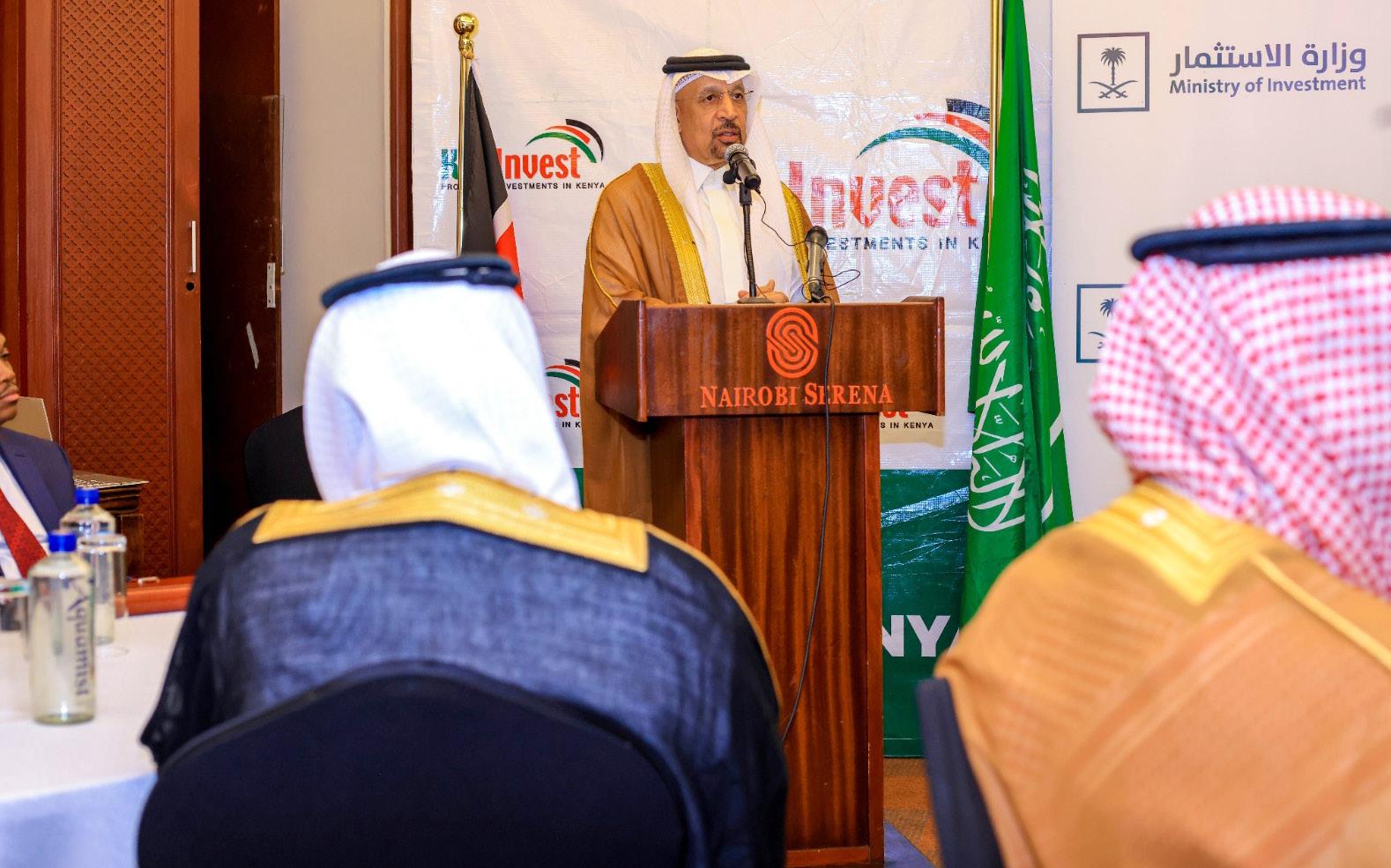
• Financial Services: A rapidly evolving sector with significant growth potential.
• Tourism: Invest in a sector rich with cultural heritage and natural beauty.
• ICT: Tap into a thriving digital economy at the forefront of technological innovation.
• Housing: Participate in addressing the growing demand for housing in a rapidly urbanizing nation.
• Agriculture, Manufacturing, and Mining: Essential sectors with tremendous growth potential.
KENINVEST: FACILITATING SEAMLESS INVESTMENT
Continuous Reforms for Ease of Doing Business
• Streamlined Administrative Processes: Kenya's ongoing reforms ensure a hassle-free investment experience.
• Specialized Support Services: KenInvest provides tailored services to meet investor needs, from inception to implementation.
Think Investment. Make IT KENYA. Join a growing list of successful businesses and investors who have chosen Kenya as their investment destination. Watch our featured videos to learn more about the opportunities and potential that Kenya offers. Invest in Kenya and be part of a story of shared prosperity and progress. Explore more opportunities and discover how you can contribute to and benefit from Kenya's vibrant economy.
Guinea’s Mining Ambitions


As the mining industry eagerly anticipates the upcoming Mining Indaba forum, the spotlight shines on Guinea, particularly its ambitious Simandou project. This venture, poised to be the world's largest mining project, marks a significant milestone in the global mining landscape.
Background and Development of the Simandou Project: The Simandou mountains in southeastern Guinea, West Africa, are at the center of this $20 billion development project involving iron ore extraction, railway construction, and port development. Initially, the UK-listed Rio Tinto secured exploration rights in 1997, but the project faced numerous delays due to Guinea's political instability, leadership changes, legal battles, and corruption allegations.
Collaborative Efforts and Stakeholders: This vast undertaking requires a collaborative effort involving multiple stakeholders,
including the Guinean government, Rio Tinto, and various Chinese companies. The project includes the construction of two iron ore mines, a 552 km railway, and a deep-water port on the Atlantic coast. Rio Tinto's investment alone is estimated at $6.2 billion, a figure surpassing its annual capital expenditure.
Strategic Importance: For Rio Tinto and the other stakeholders, the Simandou project is not just an economic endeavor but a strategic move. The project aligns with global efforts to build a green economy, especially in the steel industry, which is responsible for a significant portion of global carbon emissions. Simandou’s high-grade ore is crucial for cleaner steelmaking processes that use hydrogen and carbon monoxide instead of coke.
China's Role and Decarbonization:
China, being the world's largest steel producer, has a vested interest in this
project. The Simandou development is expected to play a pivotal role in the decarbonization of the Chinese steel industry, aligning with global climate change commitments.
Progress and Future Outlook: Despite the challenges, including Guinea’s military rule since 2021, the groundwork along the rail corridor is already in progress, with Rio Tinto aiming to begin shipping ore by 2025. The project aims to produce 6 million tons annually by 2028, accounting for about 5% of the global seaborne iron ore market.
This development in Guinea, set against the backdrop of the Mining Indaba forum, underscores the growing significance of African nations in the global mining sector. The Simandou project not only promises economic growth for Guinea but also illustrates the evolving landscape of mining, where environmental considerations are increasingly paramount.
BRICS Business Forum Eyes Emerging Markets
At the 2023 BRICS Business Forum in Johannesburg, the BRICS bloc, comprising Brazil, Russia, India, and China, announced a significant expansion with the induction of five new full members. This move, amidst the backdrop of Western dominance in global affairs, marks a strategic shift towards a more multipolar world order.
South African President Cyril Ramaphosa, speaking at the Leaders’ Dialogue, emphasized Africa’s crucial role in the global economy, highlighting its vast mineral resources and industrialization efforts. He spotlighted key minerals like lithium, vanadium, and cobalt, essential for sustainable energy solutions, as pivotal in the shift away from fossil fuels.
Ramaphosa urged BRICS nations to leverage the burgeoning African Continental Free Trade Area (AfCFTA), foreseeing it as a resilient market for investors. He pointed to the untapped investment potential in South Africa and across the continent, underlining the AfCFTA’s prospect of evolving into a massive single market.
The dialogue was attended by prominent global leaders, including Brazil’s President Luiz Inacio Lula da Silva, India’s Prime Minister Narendra Modi, China’s President Xi Jinping, and Russia’s Foreign Affairs Minister, representing President Vladimir Putin. The theme of this year’s summit, “BRICS and Africa: Partnership for Mutually
Accelerated Growth, Sustainable Development, and Inclusive Multilateralism,” reflects a commitment to fostering opportunities in Africa.
A key topic at the summit is the de-dollarization discourse, with BRICS countries exploring alternatives to the U.S. dollar in international trade. This includes the possibility of the BRICS Bank lending in Brazilian and South African currencies, indicating a shift in global financial dynamics.
The expansion of BRICS to include Egypt, Ethiopia, Iran, Saudi Arabia, and the United Arab Emirates represents a significant realignment. With an estimated combined population of 3.5 billion and a collective economy worth over $28.5 trillion, the enlarged BRICS bloc now accounts for about 28% of the global economy, signaling a shift towards a more diverse and multipolar global landscape.


G20 becomes G21 As Africa Union is Granted Permanent Membership
A MILESTONE FOR GLOBAL REPRESENTATION
In a significant development for global governance, the African Union (AU) was granted permanent membership in the G20, marking a crucial step in giving the African continent a more influential voice in addressing key global issues.
Announced at the G20 summit in Delhi, India, in 2023, this move elevated the AU to the same status as the European Union, which sits alongside 19 countries, including major powers like the UK, Russia, and the US. This decision has been widely celebrated as a rectification of historical imbalances in international relations, especially considering that, until this point, South Africa was the only African nation with G20 representation.
Indian Prime Minister Narendra Modi, hosting the summit, emphasized the inclusion of the AU as part of a broader effort to make the G20 more representative and address
global challenges collaboratively. Modi's focus on the Global South, and specifically Africa, as a priority, reflects a commitment to ensuring diverse perspectives in discussions
on critical issues like food and fuel management, terrorism, cybersecurity, health, energy, and water security.
The AU's chair, which rotates annually among Africa's five regions, represents the continent's unified voice. The admission of the AU, which had previously attended the G20 as an invited international organization alongside entities like the United Nations, is seen as particularly significant in light of the profound challenges faced by many of the world's poorest nations, many of which are in Africa.
Organizations such as the United Nations have welcomed the AU's full membership. Stéphane Dujarric, Spokesperson for the UN SecretaryGeneral, noted that this move reflects Africa's growing global influence and rectifies historical exclusion from international decision-making platforms.
Kenya’s President William Ruto also lauded this development, highlighting its potential to increase Africa's voice, visibility, and influence on the global stage. This historic decision underscores the recognition of Africa's critical role in shaping the future of global economic and political landscapes.
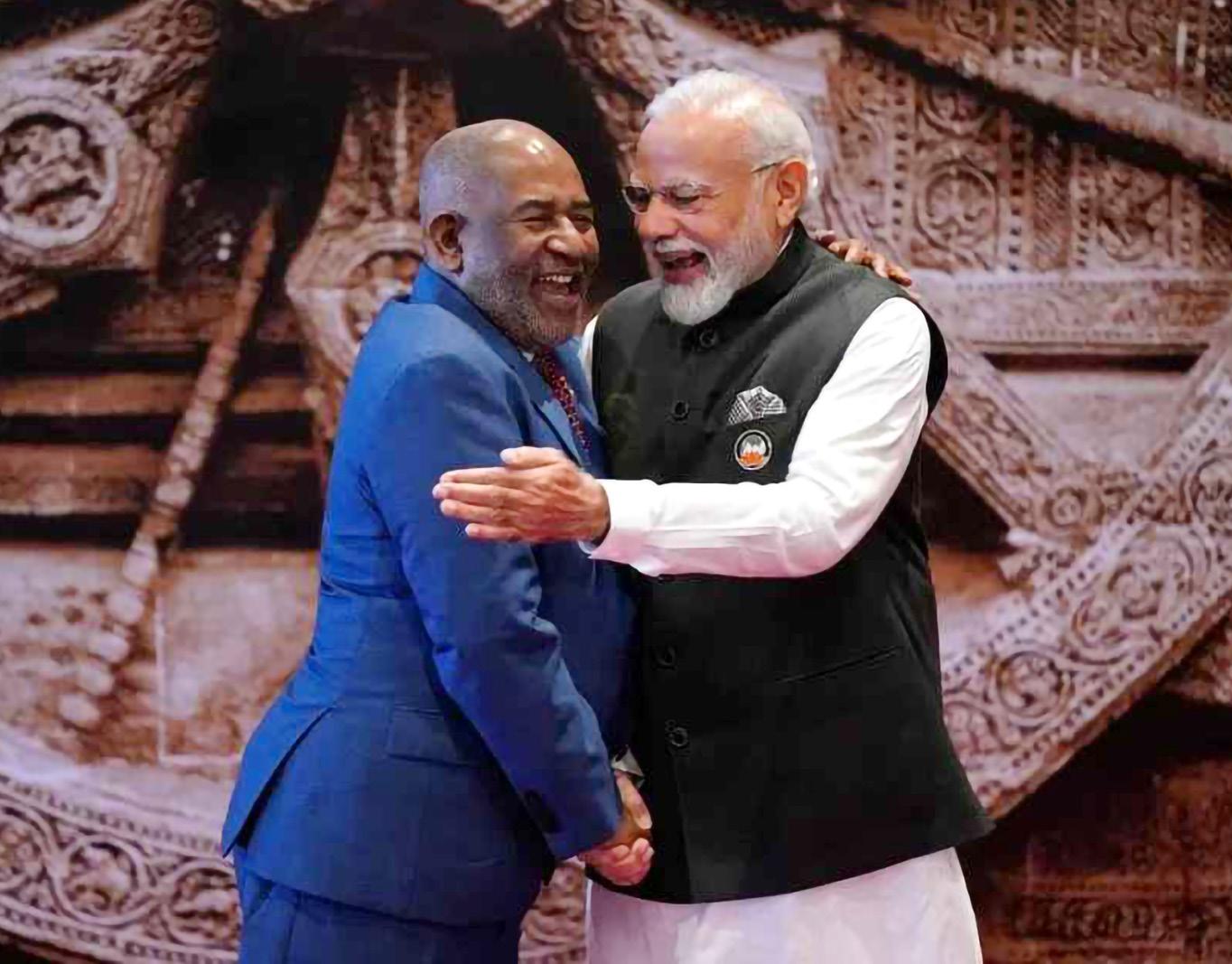
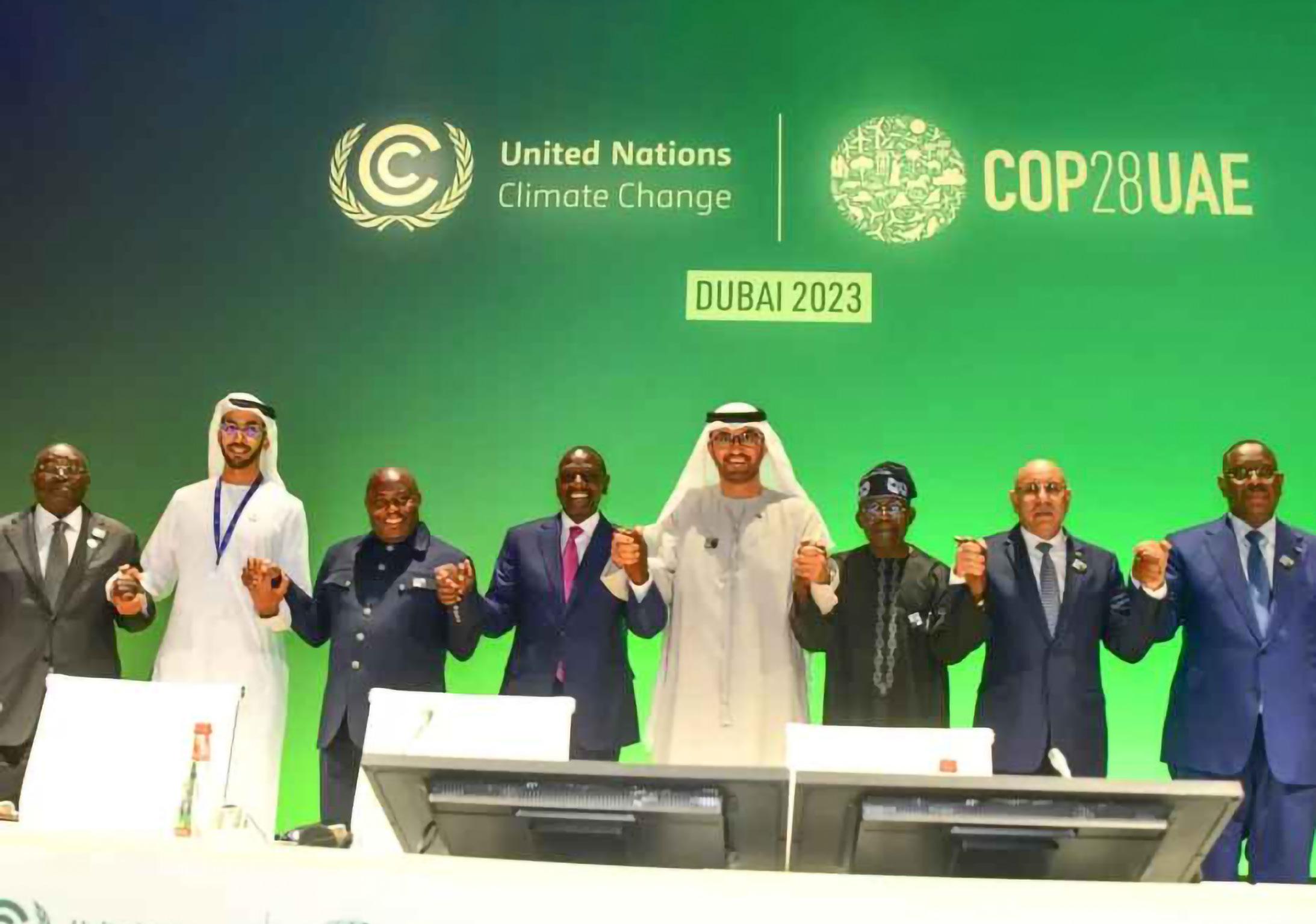
COP28 Africa to Benefit from New $420 Million Climate Fund
Africa is set to benefit from the new $420 Million Climate Fund after five countries and the EU pledged a historic new loss and damage fund that will deal with climate change.
An agreement to set up the fund was struck last year at COP27 in Egypt. This was a key outcome of an otherwise fraught summit. However, for the past year, clashes have rocked the fund over its details.
Some countries have questioned the basic issues of where it should be hosted, who should pay in, and who should benefit.
Africa and all developing countries are now eligible to apply for the fund.
At the same time, every country is free to contribute to the fund. Payments are voluntary. Some funds will go to support the least developed nations.
In a surprise move, COP28 president Sultan al-Jaber shook up the meeting by bringing the decision to the floor on day one. This marked an early success for negotiators at COP28 in Dubai.
The European Union, United Kingdom, United States, and others immediately announced contributions. The announced contributions total around $420 million for developing countries reeling from the impacts of climate change.
Likewise, the deal will provide the momentum for an ambitious wider agreement on action during the summit. Firstly, Canada will provide $16 million to tackle the impacts of the climate crisis through Loss and Damaged
At the same time, the UAE announced the landmark $30 billion ALTÉRRA climate-focused investment vehicle, the largest ever, to mobilize $250 billion of institutional and private capital into climate action by 2030.
Moreover, France announces a €100 million commitment to Loss and Damage, helping to accelerate momentum on Day 2 of COP28 and deliver for those communities most vulnerable to climate change.
Additionally, the World Bank Group committed to increasing its climate finance target to $40 billion by 2025, with 50% to mitigation and 50% to adaptation.
NBA Africa Welcomes Clare Akamanzi as CEO Spearheading a New Chapter of Growth

The National Basketball Association (NBA) recently appointed Clare Akamanzi, an accomplished business executive and international trade and investment lawyer, as the CEO of NBA Africa. Akamanzi began her role on January 23, 2024, reporting to NBA Deputy Commissioner and Chief Operating Officer Mark Tatum.
In her new capacity, Akamanzi was tasked with overseeing the NBA's business and basketball development efforts in Africa. Her responsibilities included growing the popularity of basketball, the NBA, and the Basketball Africa League (BAL) across the continent. This encompassed initiatives in grassroots basketball development, media distribution, corporate partnerships, and social responsibility programs aimed at enhancing the lives of African youth and families.
Before joining NBA Africa, Akamanzi served as the CEO of the Rwanda Development Board (RDB), where she led significant economic development initiatives, facilitating private sector growth in Rwanda. Her leadership saw the implementation of various business policy reforms, leading to notable investments and developments, including partnerships with BAL and international sports and media organizations.
NBA Deputy Commissioner Tatum commended Akamanzi’s appointment, citing her business acumen, international experience, and familiarity with basketball and the NBA as ideal for leading NBA Africa. Akamanzi herself recognized the transformative impact of sports in Africa, expressing excitement about the opportunities ahead for furthering the NBA's growth on the continent.
Akamanzi's extensive background in international trade, business, and diplomacy, including her work with the Rwandan Government at the World Trade Organization and the Rwandan Embassy in London, brought a global dimension to her role at NBA Africa. Her appointment marked a significant step in NBA Africa’s journey, with the organization aiming to inspire and connect people through the power of basketball.
NBA Africa, an NBA affiliate, manages the league's activities on the continent, including BAL. With offices across Africa and a commitment to increasing access to basketball and the NBA through various initiatives, NBA Africa under Akamanzi's leadership was poised for significant growth and development.
Amanda Dlamini Trailblazing Commentary at the TotalEnergies CAF Africa Cup of Nations

Amanda Dlamini, the former captain of the South African Women’s National Team, made history on January 17, 2024, by becoming the first woman to commentate a football match at the TotalEnergies CAF Africa Cup of Nations. Her debut in the commentator’s booth was during the Morocco vs Tanzania match in Group F, held at Stade Laurent Pokou in San Pedro.
Dlamini, who had an illustrious playing career participating in two TotalEnergies CAF Women’s Africa Cup of Nations and achieving over 100 caps, described her entry into men’s football commentary as the biggest day of her life. Her emotions were palpable as she expressed hope that her groundbreaking achievement would pave the way for more women to trust in their abilities and talents in sports commentary.
Growing up in a rural village in KwaZulu Natal, Dlamini shared nostalgic
memories of watching Bafana Bafana games during the Africa Cup of Nations with her family, recalling the intense excitement that football brought into their home. This personal connection to the sport adds depth to her commentary, enriching the experience for listeners.

Since retiring from professional football, Dlamini has transitioned seamlessly into the world of sports analysis, working as an analyst for SuperSport on local and CAF Inter-Club matches and joining the CAF Analysts team for the Women’s Africa Cup of Nations in 2022. Her commentary style is insightful, focusing on the teams’ backstories, their objectives, and the coaches’ strategies. She also emphasizes the importance of understanding player tactics and formations, areas where she expresses a desire to further her expertise.
Dlamini’s journey from a celebrated footballer to a pioneering commentator is a testament to her passion for football and her commitment to advancing women’s roles in sports broadcasting. Her story is not just about breaking barriers but also about enriching the football narrative with diverse perspectives and deep insights.





Africa Mission Updates
2023-2024
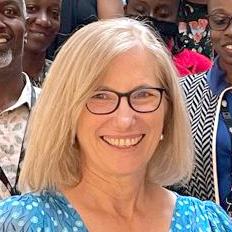
DIPLOMACY & TRADE: AUSTRALIA HIGH COMMISSION TO KENYA
Ms Jenny Da Rin

Austrade Relocates its African HQ Offices to Nairobi Trade Commissioner: Scott Morriss

KENYA EXPANDS ITS FOREIGN MISSIONS TO APAC
The High Commissioner of the Republic of Kenya
His Excellency Amb. Galma Mukhe Boru
Countries: Indonesia, Philipines, Singapore

RWANDA IN APAC
High Commission for the Republic of Rwanda
His Excellency Amb. Jean de Dieu Uwihanganye
Countries: Australia, New Zealand, Singapore, Indonesia
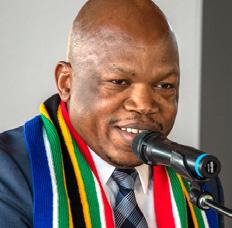
SOUTH AFRICA HIGH COMMISSIONCANBERRA AUSTRALIA
Acting High Commissioner for South Africa (30 June 2023)
Mr. Leonard Advocate KHOZA
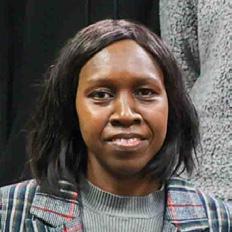
KENYA HIGH COMMISSION –CANBERRA AUSTRALIA
Acting High Commissioner for Kenya (06 December 2023)
Ms Betty CHEMOIWA

NIGERIA HIGH COMMISSIONCANBERRA AUSTRALIA
Acting High Commissioner for Nigeria (01 December 2023)
Mrs. Mercy Osebhon CLEMENT

GHANA HIGH COMMISSIONCANBERRA AUSTRALIA
His Excellency Amb. Samuel Yao KUMAH

ZAMBIA’S HIGH COMMISSIONAUSTRALIA AND NEW ZEALAND
H. E Amb. Dr. Elias Munshya

HIGH COMMISSION OF THE REPUBLIC OF BOTSWANA - AUSTRALIA
Her Excellency Amb. Dorcas Kobela MAKGATO

EMBASSY OF THE FEDERAL DEMOCRATIC REPUBLIC OF ETHIOPIA
Ambassador of Ethiopia (27 July 2023)
His Excellency Amb. Hadera Abera ADMASSU
Events Coming
• Mining Indaba
Cape Town CITCC 5th -8th February 2024
• Africa Tech Summit 14-15 February 2024
• ASEAN Summit Melbourne 4-6 March 2024
• US - Africa Business Summit
DALLAS, TEXAS | MAY 6 - 9, 2024
• Elit Africa
Cape Town CITCC
16- 18 May 2024
BUSINESS SUMMIT
U.S.-Africa Business: Partnering for Sustainable Success
May 6-9, 2024
Dallas, Texas

Receive 20% off registration before March 29, 2024
The U.S.-Africa Business Summit, hosted by Corporate Council on Africa, is the premier conference promoting U.S.-Africa trade, investment, and commercial engagement. It will bring together more than 1,500 U.S. and African public and private sector leaders including African Heads of State, institutional investors, U.S. and African government officials, and multilateral stakeholders over the course of the 4-day Summit. The objective is to provide a high-level platform for U.S. and African government and private sector decision makers to engage on key sectors and issues impacting the U.S.-Africa economic relationship, and to drive U.S.-Africa sustainable business partnerships.
Register Now at www.usafricabizsummit.com
Emerging Brand Africa (Advertising)
Connect with with us for media partnership and advertising
@emergingbrandafrica @emergingbrandaf emergingbrandafrica.com
